Text
The quintessential quintuplets anime review

Spoilers for the quintessential quintuplets
Genre: slice of life, romance, harem, high school
Where I watched it: Funimation
Characterisation: 7/10 (Like a lot of aspects of this series, the characterisation was almost there, but not quite. All the sisters are given distinct personalities, with different talents, ambitions and mannerisms, so their characters were reasonably well developed. They had their own interests and strengths, which made the show a lot more interesting. However, it annoyed me that they were all so needlessly dense in some respects, even when they worked incredibly hard- it was slightly demoralizing to watch, as I was really rooting for them to do well in school. This point mainly applies to Yotsuba, who’s a very sweet girl, but her lack of intelligence (and the way it tries to be funny and miserably fails) was genuinely annoying. Personally, I disliked the protagonist, Futaro- not only did he lack a proper personality and character development, which made him a boring protagonist, but the traits which were unique to him weren’t exactly pleasant. He is constantly shown believing he’s better than others due to his high grades, and he always alludes to the quints being intellectually lacking, sometimes literally calling them stupid, because they struggle at school. Most side characters were fairly unremarkable, and the cast is fairly small, but this isn’t necessarily a bad thing.)
Setting: 7/10 (I like the idea of the quints sharing one house and living alone- it illustrated the kind of family life they had, as well as driving home the point that, despite being very close, they were very different personality wise. The best feature of the setting is the house that the quints move into during the second part of the anime after deciding to become independent from their father- it adds a “rich girls become independent from their father and finding their own path in life” feel, which made me really root for them and want to see them succeed. The grandeur of their former house contrasts that of the smaller house they now share, and it also highlights the financial difference between them and Uesugi’s humble family when we see his house. The high school they go to serves as quite a good setting, catering to the plot well, and, during the school trip to the mountains, setting was also used well to create a sense of adventure and excitement as potential romances, as well as problems, developed and spiralled.)
Art style: 8.5/10 (This anime has really stunning graphics- the characters are drawn in a very attractive style with colour pallets which reflect their personality and are equally pleasing. Settings are drawn with the same amount of care and attention to detail, so overall, the series has high quality visuals.)
Plot: 4.5/10 (The plot is pretty lacking on all fronts- it lacks an element to make it engaging and hook viewers, because the anime is so casual that there’s very little to actually become invested in. It felt like not much progress was being made towards a climax or resolution; most of the anime had very little actual plot to it. At the end, everything sort of happens at once, which feels incredibly rushed, and it means that, at least in my opinion, Uesugi’s relationship with the girls were poorly developed before everyone jumped in, so the idea of those relationships was a lot less impactful. The ending was definitely the lowest point, as there was a huge time skip to the wedding of Futaro and one of the sisters (probably Yotsuba) which, you could argue, was fitting, because they met all those years ago and Yotsuba became Futaro’s first love, leading to him changing from a “bad boy” to a hard working “nerd”. Uesugi doesn’t recognise Yotsuba in the modern timeline, but one could argue this still makes for a fitting ending, because it is clear that Uesugi is still deeply affected by his first love. However, this doesn’t take away from how rushed everything was- none of the relationships (not even the one with Yotsuba) were properly developed, so things just kind of went from 0 to 100 without any kind of bonding or story behind it. There are also a few plot holes- we never find out who Rena is, we merely know she’s a persona taken on by one of the quints to be a fictional version of his childhood crush, but this part of the story is never explained or developed. It also annoyed me that everyone had to fall for Uesugi of all people, because f how badly developed his personality was and how arrogant and unlikeable he was as a person. However, there were quite a few twists and it was definitely not predictable. Another aspect of the plot which was delivered quite well was the girls’ improvement at school over time, as they keep studying and working. )
Addictiveness: 5/10 (Because it lacked a proper, dynamic plot, the anime had nothing which kept me hooked or engaged. There were no intriguing elements, and I never found myself becoming very invested in either characters or plot.)
Originality: 6.5/10 (Despite being poorly executed, the plot definitely isn’t a cliche- it is full of twists and has a wealth of aspects I’ve never seen anywhere else. The anime messes around with slow burn and harem aspects, disguises (this is a recurring motif in the anime, as the quints often dress up as each other when needed) as well as financial issues, student lifestyles and different, well established relationship tropes to create something unique, even if it’s not your taste.)
Comfort: 6.5/10 (The anime is relaxed and light hearted, as well as quite hopeful in tone as the girls strive to do well and forge their own paths in life. Despite this, it isn’t necessarily comforting, as it usually lacked the warmth necessary for that, and the highs were often placed alongside lows or events that were simply unremarkable.)
Philosophy: 4.5/10 (The plot lacks complexity and depth, as do many of the characters, so nothing about the anime really made me think- there’s no sort of message or idea for viewers to think about.)
Consistency: 6/10 (The quality stays consistent throughout most of the anime, but it takes a nosedive with the incredibly rushed and poorly developed ending.)
The plot
Futaro Uesugi is a top student who works part time as a tutor, making money to help support his family, who struggle financially. One day, he’s offered a job which pays over 5 times the normal rate. When he goes to the address provided for the first lesson, it becomes clear why- he’s tutoring the quintuplets who just transferred to his school from a prestigious one. The girls are very dismissive of Uesugi at first, and don’t want to go along with his plan to study despite their failing grades, so his job becomes pretty difficult. The quints are constantly all over the place, denying him and doing anything but studying. Even Itsuki, whose dedication to her studies is clear from the beginning, hates the idea of being tutored by him and goes off for solo sessions. However, as he begins to learn more about the girls as individuals and discovers things about their interests, personalities and ambitions, Uesugi gradually starts to earn their trust and get them to follow instructions. The first instance of this is with Miku, who’s shy and quiet, but secretly obsessed with history. Upon discovering this, Uesugi studies as much history as he can so Miku can feel understood. Slowly but surely (and with a lot of bumps along the way) the others follow suit, getting used to Uesugi’s presence in their life and starting to view him as more than just a friend or a tutor. As time passes and the girls grow increasingly aware of their feeling for Uesugi, it becomes clear that the nature of their relationship with him is taking a huge shift as a a competition for who gets to be with him starts, gradually building up to confessions and even more confusion, with Uesugi learning several things about emotions and love on the way.
Masterlist
#itsuki nakano#miku nakano#nino nakano#ichka nakano#yotsuba nakano#futaro uesugi#raiha uesugi#the quintessential quintuplets#the quintessential quintuplets review#the quintessential quintuplets anime review#harem anime#romance anime#slice of life anime#high school anime#jolyneswifeanimereviews#anime and manga#anime recommendation#anime reccs#anime fandom
10 notes
·
View notes
Note
Hii could you please recommend some soft chill anime that’s wlw or queer ??
Hey ! I'm, sorry, but I'm afraid I don't really know of many myself. I've been searching for good ones for a while, and I'll definitely update you if I find anything. The closest thing I can think of is Sailor moon, because of the queer subplot involving Michiru and Haruka's relationship (make sure to watch it subbed though, because the old dub tried to erase their relationship). Their relationship is a very wholesome one, and I won't spoil too much, but let's just say it's the soulmates kind of bond everyone would want. I'm sorry I can't recommend anything much better at the moment, but thank you for your lovely question. Stay safe <33
#sailor moon is pretty gay all around tbh#anime fandom#queer anime#anime recommendation#sailor moon#michiru kaioh#haruka tenoh#wlw in anime#anonymous asks#jolyneswifeanimereviews
2 notes
·
View notes
Text
I really want to thank everyone for all the love that my Sayaka and Kirari post got- I was really not expecting it to do so well, and seeing so many people like and reblog genuinely filled me with pride. I appreciate you all <33

If you haven’t read the post yet, click here.
In the future, I plan on releasing more content related to Kakeguri, so stay tuned for that :)
#thank you#mod speaks#kirari x sayaka#kakeguri kirari#kakeguri sayaka#kirari momobami#sayakira#kirasaya#sayaka igarashi#kakeguri#kakeguri xx#jolyneswifeanimereviews
19 notes
·
View notes
Text
Sayaka and Kyoko relationship analysis (and why I love them!)
Madoka magica spoilers (including Rebellion) and tw for death, mentions of murder, depression, alcoholism, and suicide

Kyoko Sakura and Sayaka Miki fall under that category where, even though romantic feelings aren’t canonically confirmed, there’s so much subtext that it becomes impossible to view them as “just friends”- there are constant hints they could be more than that, despite Sayaka’s own very difficult experiences when it comes to love. Most fans pretty much consider a couple, and, in this post, I’ll be trying to unpick their complex relationship.
Act 1~ Opposites attract/enemies to lovers ?
The first time the two cross paths is right after Mami’s death- Mami was a role model and a guide to Sayaka, displaying everything a perfect magical girl should be. After her death, Kyoko decides to claim the territory of Mitakihara as her own for hunting witches so she can find grief seeds, but, before she can do this, she learns from Kyuubey that Sayaka is the new magical girl in the territory. Kyoko is very dismissive of her, and makes it clear that she will take the territory by force if necessary. Right off the bat, Kyoko is established as someone selfish and cold, with little regard for lives that aren’t her own. This paints her as the complete opposite of Sayaka, someone who is distinguished by her selfless nature and powerful moral compass, to the point that she’ll tear herself apart to save someone else. As I’ve mentioned before, opposites attract is one of my favourite tropes, due to the complex and engaging dynamics often creating by two people who are so different sharing such a bond. There’s also a huge overlap with enemies to lovers, in the sense that these characters are on different sides, with opposite visions of the world and ways of doing things. They hate each other, until they don’t- because emotion, and especially, human personalities, are not that simple, and sometimes, those who appear to be the most different can actually understand each other best.
The two meet properly the next episode, with Kyoko attacking and taunting Sayaka- she views her as “naive” for her belief in justice, and explains how, in her view, Magical girls are strong and should use this to their advantage instead of caring about weak humans. This reinforces the view we previously had of Kyoko as a selfish and cold-hearted person. Sayaka fights back despite the fact that Kyoko is several times stronger; she’s outraged by the things Kyoko is saying and believes they are disrespectful to Mami’s legacy of a “good” Magical girl. The two almost kill each other, and they fight might have escalated even further if Homura hadn’t butted in. At this point, the two have solidified their relationship as enemies and polar opposites, with both of them being happy to kill the other.
Act 2~ When hate turns to love
As Sayaka’s despair takes a turn for the worse because she’s not purifying her tainted soul gem and her relationship with Kyosuke isn’t going in the way she probably hoped it would after she used his wish to heal him, we are introduced to a softer, more human Kyoko. While in her room, Sayaka hears Kyoko tell her through telepathy that they need to talk, and she doesn’t sound scornful like she did a few episodes ago. Sayaka reluctantly follows, and Kyoko takes her to a dilapidated church.
After offering Sayaka an apple in an unexpected show of friendliness, Kyoko opens up to Sayaka about her past. The church had belonged to Kyoko’s father, a radical preacher who gave sermons that didn’t fit with the Bible. This caused the congregation to get mad and leave; everyone started treating him like a madman, and this led to Kyoko’s family struggling to afford basic necessities. When Kyoko made her contract with Kyuubey, she wished for people to listen to what her father had to say. Soon, people were coming in large groups to listen to him, lifting her family out of their poverty. An interesting thing about this scene is that, after Kyoko explains that she started fighting witches “full-time”, she says “We were gonna save the world, my dad and I,”. This is the first hint that another side to Kyoko exists- there was a time when she believed in justice, kindness and caring for others. Because of this, I think she sees her younger self reflected in Sayaka, and, while that might have caused her pain or anger initially, and she was probably reluctant to admit it, Kyoko then realises that she wants to protect Sayaka so she doesn’t have to suffer like she did. Despite her well meaning wish, when Kyoko’s father discovered about the truth of her wish, he called her evil and started drinking heavily, before becoming depressed and committing suicide. Kyoko explains to Sayaka that the thing she wished for, something that came from good intentions, had destroyed her family; she had learned that magic should only ever be used to serve the magical girl, because using it for anything else would lead to everyone suffering. As well as providing us more insight on Kyoko’s mindset and her true, caring, nature, this scene represents an important development in their relationship. Not only does Kyoko feel close enough to Sayaka to share all those things, but she also cares for her in a way she seemed previously incapable of doing to anyone- by telling her the truth, Kyoko hopes to warn Sayaka and save her from suffering, even telling her to “take what she has and figure out how to make something out of it” in an effort to show her the positive side of things. From this, we can gather that Kyoko has obviously grown inexplicably attached and close to Sayaka, because she wouldn’t have done this for anyone else- it goes against the image of Kyoko we were presented with at the start.
During Sayaka’s fight against Elsa, which is the first scene we really see how emotionally broken she is and how deep she has descended into despair, Kyoko tries to step in, but not out of selfishness or because she wants a grief seed- she has seen how much Sayaka’s constant fighting is harming her, mentally and physically, and wants to protect her, building once again an image of a more caring and selfless Kyoko, which got unearthed by her meeting Sayaka and being reminded of justice. After years of living for herself due to her trauma, only Sayaka could bring out that side of her, which marks their relationship as truly special.
Act 3~ The end ?
Just before Sayaka turns into a witch, Kyoko shows up, saying she’s been looking for her everywhere. The fact that Kyoko is the one to find her in this depressed state is very significant, as, after what she revealed to Sayaka a few episodes before, it becomes clear that she understands her and her suffering on a level no one else can. It also shows Kyoko’s devotion and genuine concern- because of her affection for Sayaka, she has completely abandoned her selfish mindset and is putting herself in harm’s way to help her, which would have been unimaginable when the two first meet. It turns out that Kyoko is too late- after a short conversation, Sayaka reaches peak despair and turns into a witch.
Despite the dangers involved and Homura telling her it’s pointless, Kyoko manages to retrieve Sayaka’s body, carrying it out of the labyrinth alone. The increasing amount of risk Kyoko is putting herself in shows how precious Sayaka actually was to her- she seems like a completely different person now. She even goes as far as using energy from her own soul gem to keep Sayaka’s body fresh, holding out on some hope that she’ll be revived. This seemingly mournful behaviour goes completely against her earlier priorities of self preservation.
After being mislead by Kyuubey into thinking that there could be a way of reverting Sayaka back to her human form, Kyoko is willing to risk it all on that small chance. Again, the fact that it was her caring for Sayaka and she was the one who came up with the plan shows how intertwined the two are- it links them together, as well as further pushing the idea that Sayaka and her values are precious to Kyoko. Here, we see Kyoko teaming up with Madoka, Sayaka’s best friend, to attempt her risky plan. It’s significant that Madoka isn’t doing all these things despite having been Sayaka’s best friend- this makes it seem like the more significant and meaningful connection is the one between Sayaka and Kyoko, as they have become the central figures in each others’ lives. Her teaming up with someone despite having nothing to personally gain from it also cements that, because of Sayaka, a new part of Kyoko has been brought out, one capable of loving others and being selfless again. Kyoko confirms this herself verbally when she tells Madoka that Sayaka reminds her of fairy tales where love and courage always prevail, stories she used to love as a little girl but forgot later on in life. Sayaka was the one who reminded her of these, which is why the two share such a special and close knitted bond.
When things start to go downhill during the battle with Sayaka’s witch form, Homura appears to rescue Madoka, and Kyoko offers to sacrifice herself to save them both, as well as saving Sayaka from the suffering of being a witch- after all that’s happened, their dying side by side seems oddly fitting. While preparing the attack that will cause both their deaths, Kyoko says comforting, kind things to Sayaka, despite the fact she can’t understand, which, once more, alludes to their deep understanding and connection. Kyoko then takes out her soul gem, and, giving it a kiss, throws it in Sayaka’s direction. This was a heart wrenching, yet deeply romantic, way to say goodbye.
The credits of this episode show the image used as the header for this post, where, once again, Kyoko is shown happily sacrificing herself to save Sayaka from drowning- despite being in such a dangerous situation, the two are at peace now that they’re side by side. Kyoko also can’t swim, which makes this image of her holding an unconscious Sayaka underwater all the more touching and heartbreaking.
Act 4~ Rebellion
Rebellion is the film about what happens after the pmmm anime, and most of it takes place in Homura’s mind- after her own descent into despair, she’s built an idealistic version of the world she lived in with all the same people
Throughout the first part of Rebellion, Sayaka and Kyoko are shown as incredibly close friends, despite bickering like an old married couple. Kyoko then reveals in a conversation to Homura that she’s been living at Sayaka’s place, which further pushes the idea that the two are so close that they could have feelings for each other.
During the last battle in Rebellion, the two are shown holding hands and standing back to back, as Kyoko tells Sayaka that she had a terrifying nightmare in which she was gone, and the reason she came back was to be with her, all the while Sayaka looks shyly pleased. This really shows how much the two value each other and how intimately close they are, and it strongly implies that there’s something more than friendship between them.
Towards the end, the two are shown sharing pocky sticks and smiles away from everyone else, like a couple.
Act 5~ Visual storytelling ?
Official art often features these two as a pair, close together, sharing smiles and snacks or looking a bit shy. The overall vibe is very couple-like.

As most fans will know, visual storytelling is very prominent in Madoka Magica, particularly when it comes to witches. There’s often a huge amount of complex detail, most of which is left to the viewer’s interpretation. Because of this, I thought it might be possible that Sayaka and Kyoko’s witch forms were somehow linked, proving their never ending importance in each other’s lives.
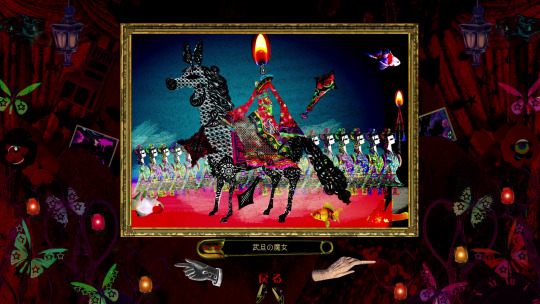
Kyoko’s witch form is shown above- what stands out to me is that she appears to be riding a horse, witch has connotations of knights. Knights, as well as their association with justice, are a crucial part of Sayaka as a magical girl, both in her costume and the way she behaves, so maybe this could be paying homage to her.
There are also fish surrounding Kyoko, and she appears to be underwater. The blue might be linked to Sayaka’s colour pallet, and the idea of being underwater to the image we see of them after their death, which implies Kyoko is willing to be with Sayaka even when it causes her harm.
(Shakespearean allusions ?)
The name “Ophelia” is also significant. In Shakespeare’s play “Hamlet” Ophelia dies due to her lover’s actions, which could be saying the same thing is going on between Sayaka and Kyoko. The mottif of water and drowning are also a nod to this, as Ophelia died by drowning.

This is Sayaka’s witch form. You may notice that there are several magenta accents on her, which could link to Kyoko’s colour pallet. She also appears to be wearing armour, linking again to the theme of knights and tying her in with the horse in Kyoko’s witch form. The mermaid tail once again links to the theme of the sea, which is also seen in Kyoko’s witch form, and in one of the last times the two are portrayed together. The concert seats at the back also remind me a bit of the red structure Kyoko made just before dying to protect Madoka and herself.
I literally rambled SO much, so thank you if you got to the end of this.
Masterlist
#kyosaya#kyoko x sayaka#kyoko sakura x sayaka miki#kyoko pmmm#kyoko sakura#sayaka pmmm#sayaka miki#sayaka miki character analysis#kyoko sakura character analysis#puella magi madoka magica#pmmm#anime and manga#jolyneswifeanimereviews
4 notes
·
View notes
Text
Citrus anime review
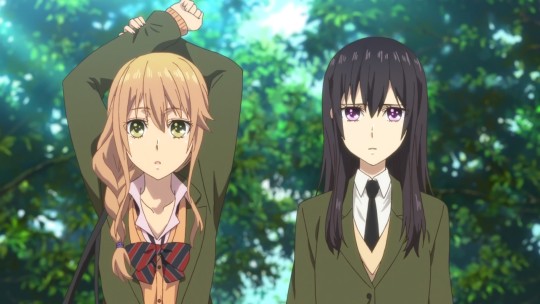
Spoilers for citrus and tw for stepcest, non consensual touching, a teacher being engaged to a minor, cheating and sexualisation of queer women (this anime is definitely not worth watching)
“I felt bitter to the people around me and I closed off my heart. And a heart that lets nothing in will become empty before you realize it,”- Mei Aihara
Disclaimer: I have watched all the episodes out so far, and I despise this anime with a passion. I tried very hard to like it, but I just couldn't because of several very irritating aspects of it. This WILL be somewhat of a rant because of this.
Genre: Yuri, romance, high school, fanservice
Where I watched it: Funimation
Characterisation: 7/10 (Let's start with the things that the series did well on. I quite liked the cast, and the characters themselves were reasonably well designed- the ideas behind personalities, mannerisms and backstories were good, but I felt like in most cases, characters were lacking when it came to complexity and development. They didn’t change much or show many different sides as the series went on, they stayed very much the same for the most part, except from Matsuri, who grew to accept Mei after realizing that love wasn’t a competition or simple, and recognising the good things about her. Harumin was my favourite character, personally- she was funny and light hearted, as well as being the kind of best friend every girl needs. I also adored her more “public school” mannerisms compared to those of the prim and proper private school girls. Yuzu was also quite a good protagonist- she was an outsider in that upstanding school, where the things she considered normal and fun were seen as improper. As well as that, she was kind, as well as being determined- when she put her mind to something, she achieved it, which is shown by the improvement in her grades and and effort she put into making a cake from scratch for Christmas. However, when it comes to more emotional and complex matters, Yuzu is so clueless that it’s almost irritating. If I’m being honest, Mei just felt a bit like the overused serious character with a tragic backstory, which, I have to admit, was reasonably well developed. She herself wasn’t very developed as a character, her personality lacking depth and complexity.)
Setting: 7.5/10 (The setting is another thing that the show executes quite well, despite it being pretty basic. I love the idea of Yuzu, this extroverted and somewhat rebellious state school student, arriving in a luxurious private school and being completely out of place. Yuzu and Mei’s bedroom also has a nice design, with half of it clearly belonging to Mei and the other to Yuzu; the furniture reflects the girls’ interests and lifestyles. The idea of taking a school trip towards the end was a good one too, and it provided an opportunity to introduce new characters as well as a much needed change of scenery, with exciting new things to explore and incorporate into the plot.)
Art style: 8/10 (Probably the only noteworthy high of this series. The way the characters are drawn, as well as the colour pallets chosen and the attention to details, is astonishing. Outfits are also modelled to suit characters and their personalities, which added to that appeal. Settings are drawn with a similar care and in a picturesque way.)
_ Ranting starts here_
Plot: 2/10 (I found this anime while searching for anime with wlw relationships, and I was really excited to watch it- it was the first time I had encountered an anime where the protagonists were both queer girls. What really stings is that on the surface and after watching the opening theme, it seemed like a good anime which portrays a relationship the way straight ones are often portrayed- with care and adding complexity. However, this isn’t really the case at all. As well as lacking development and not being dynamic, the plot also fails to develop Yuzu and Mei’s relationship on a deeper level, with things like quality time spent together or deep, honest conversations. On top of that, after first meeting Mei at her new school, Yuzu discovers that she’s the daughter of her mother’s new partner, which makes them step-sisters. This made me incredibly uncomfortable, because they referred to each other as sisters but often made romantic advances, sometimes hesitating but ultimately deciding to date regardless of the fact that they’re step-sisters. This was a difficult, sensitive topic and needed to be handled properly, which the series totally failed at doing. Also, when Matsuri entered the picture and admitted to her own romantic feelings for Yuzu, she too referred to her as a “big sister”- personally, I’m really uncomfortable with the way the series romanticised this particular type of relationship. Another problem I have with the plot is that when Mei and Yuzu made advances, it was sometimes non consensual, but still presented in a romantic and rose tinted way, which was disturbing to see. Lastly, I hated that their relationship was presented in such an overly sexualised manner- sometimes, they either didn’t interact much or made out intensely. It feels like their relationship was created more for the sake of fan service than to make something romantic. Sexualising women is already very common in many anime, but queer women experience a lot of sexualisation based on the fact that some men fetishize wlw relationships, so the fact that these two queer minors were portrayed in such a sexual light sometimes was annoying. I don’t mind “spicier” scenes, but, in my opinion, to make a romance anime good, these need to be coupled with a complex and deep relationship, and scenes of the characters bonding and growing close in other ways. Citrus simply didn’t have enough of that, so it just felt like a way to sexualise wlw relationships for the sake of fanservice rather than good representation. Another terrible aspect of the anime was the relationship between Mei and that teacher at the start of the series. The two were engaged, despite Mei being a minor, which is horrifying to think about. Not only is it illegal, it’s disgusting. Later on, Mei claims that didn’t enjoy being kissed by him, and doesn’t seem too affected by the end of their relationship after she finds out he cheated she doesn’t seem too bothered, which implies Mei was unhappy in that relationship. Apart from that, the show did a poor job at actually addressing this theme or expanding on why it was happening and the potential impact on Mei’s life, as well as neglecting to paint it as something harmful that should be condemned. The whole thing just kind of dies out as the focus shifts to Yuzu and Mei, which is an unrealistic and harmful way to portray such damaging relationships.)
Addictiveness: 3/10 (There was nothing about the series which kept me hooked, mostly because it felt like there was no actual plot, and the episodes felt monotonous. You also do not become invested enough in the characters due to the poor development to care about what happens next. There were a few twists, but overall it was not engaging.)
Comfort: 4/10 (This anime deals with several topics I’m not comfortable with, with an unhealthy relationship being just the tip of the iceberg. This, along with the lack of light and joyous, yet gripping moments, is why I gave it a low rating. The only things which comes close to saving it are Sarah’s wholesome outlook on life and her selflessness in prioritizing Yuzu’s happiness over her own when she realizes they both like the same girl, and Yuzu’s ride-or-die friendship with Harumin, which is a friendship all viewers would probably want.)
Originality: 5/10 (Nothing in this series really struck me as original or innovative, apart from maybe the idea of Yuzu coming from a completely different background to the new prestigious private school one, and what that means for her when she starts attending that school and becomes legally related to the director.)
Consistency: 5/10 (The quality of the anime seemed OK for the first part of the first episode, but it soon took a nosedive. It stayed consistently low throughout the rest of the series, being bumped up a little by the introduction of Harumin and later of Sarah and Mina, two very different twins with a realistic relationship as sisters. Sarah’s perspective on her sexuality is refreshing and simple after Yuzu’s own confusing love life and her complex relationship with Mei. She simply loves who she loves, and that’s all there is to it.)
Philosophy: 4/10 (The anime, and its characters, lack depth of thought, so it’s not surprising that it gives viewers nothing really substantial to think about.)
The plot
Yuzu Aihara just transferred to a new school after moving house due to her mom getting a new partner, who’s away due to work a lot. Yuzu is optimistic, relaxed and extroverted. She loves fashion and fun, and she really wants a boyfriend. As soon as she enters the new, prestigious all girls school, she realises she is somewhat out of place. Everything about her outfit violates the uniform rules, and she is told that having her phone on her is forbidden. After Yuzu refuses to hand it over, the student council president, Mei Aihara, unexpectedly feels her up until she finds the phone, before confiscating it and leaving Yuzu flustered. Throughout the day, Yuzu tries to make friends with other students, but they’re all very reserved. She then meets Harumin, another girl who transferred in high school; Harumin explains that thing are different at this school, as all the girls have been taught to “mind their ps and qs”. She and Yuzu quickly become close friends. When Yuzu returned home that day, she found Mei there, and made an astonishing discovery- the girl was now her step sister: she was the daughter of the man her mother had married. The two girls start their life of co habitation, learning more about each other and developing increasingly strong feelings for each other, despite their circumstances. Both are confused, and their relationship is rocky and unhealthy throughout the show. After a while the two get to know each other a bit better and they realise that they are faced with an extremely complex situation, one where the wrong choice seems to be the “most tempting”.
#mei aihara#citrus anime review#citrus anime rant#anime review#anime and manga#yuzu aihara#himeko momokino#yuri anime#matsuri citrus#sarah tachibana#nina tachibana#harumin citrus#jolyneswifeanimereviews#citrus review#citrus anime#sarah citrus#nina citrus
14 notes
·
View notes
Text
My love for Sayaka and Kirari
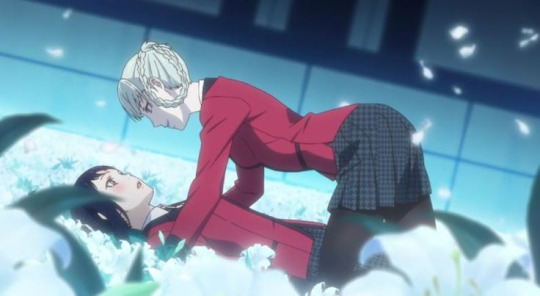
Spoilers for Kakeguri and tw for obsessive behaviour
Kakeguri was one of the biggest animes around about a year ago, and it definitely did well with queer representation. As anime, it definitely has a lot of ups and downs (which I’ll be discussing in a later post), but the most significant aspect of it for me was the relationship between Kirari Momobami, the school president, and Sayaka Igarashi, her assistant. Even before I realised what my own sexuality was, seeing this couple made me happy in a way that I couldn’t quite put to words. In this post, I’ll get into why I loved them.
- They aren’t just irrelevant side characters who barely get any screentime: In many shows, the queer characters will be the ones who get little screentime and are badly developed- their personalities will lack the complexity that straight characters have. Though has improved a lot recently, queer people are still underrepresented in many forms of media. As well as being two important side characters who are significant to the storyline (Kirari is Yumeko’s main rival, as well as the reason why the school turned into what it is today), both are given personalities and aspirations, as well as little traits which are unique to them. From Sayaka’s studious, logical approach to Kirari’s warped and incomprehensible, yet almost philosophical, way of seeing the world, both characters were given depth and complexity.
-Their feelings for each other are expressed quite explicitly at several points: After the towers of doors game, it becomes obvious that Sayaka has romantic feelings for Kirari, with Yumeko herself confirming it verbally. While Kirari doesn’t explicitly say she returns these feelings, her actions speak for her when she jumps down with Sayaka and pins her down to the ground, before giving her a hand up and asking her to be her secretary (with Sayaka blushing like mad all the way through the conversation) despite the promise that they would become “strangers” if Sayaka lost. There’s also another subtle detail which most viewers might have missed- during this conversation, the two are surrounded by lilies, which are a recurring motif in this episode. Lilies are associated with wlw relationships in Japan, with the word for lily, “yuri” being used to describe wlw manga and anime. Throughout the anime, Sayaka is shown almost obsessing over Kirari- doing everything she can for her, and always being by her side. Whenever someone hits on Kirari or talks to her in a way Sayaka deems disrespectful, she is quick to lose her cool and threaten that person, even if the former is unfazed. With all this, it becomes evident how the two feel about each other, and there’s no other way of interpreting their relationship. Many anime will use subtext to hint that a character is queer, or has romantic feelings for someone of the same gender, but it will never be explicitly confirmed, which doesn’t make for particularly good representation. Due to this, I loved that their relationship was so boldly what it was, leaving no room for interpretation.
- Opposites attract is one of the best tropes: This is just a personal opinion, but I love seeing people who are polar opposites fall in love- it creates such interesting and entertaining, yet endearing, dynamics. This is definitely the case when it comes to Kirari and Sayaka- Sayaka views everything from a very logical point of view, whereas Kirari prefers to do whatever she feels like, even if it’s impulsive or risky, as she despises feeling “bound” by logic. They introduce each other to completely opposite worlds, and each girl doesn’t quite understand how the other thinks, but that’s why they love each other so much- they are out of each other’s comprehension.
- Their relationship was a part of, but not their whole story: Admittedly, this point applies more to Kirari than to Sayaka, whose being is very much centered around Kirari. Outside of her relationship with Sayaka, Kirari is still the main “antagonist” in the story- she was the one who designed the brutal gambling system in the school and who sits on top of the hierarchy, undefeated. She’s also the next head of her clan, the Momobami clan, which is made up of several families, and this causes a lot of conflict between Kirari and members of the other families, who later transfer to Hyakkao private academy after she steps down as president in an effort to overthrow her. Although there’s nothing wrong with making a character’s sexuality or love life a big part of them, it was nice seeing a queer woman in media who also had several other traits to her, from her insanity to her stylish way of doing her hair and makeup- she felt more realistic due to this. Sayaka too is given her own distinct personality and backstory as a “genius girl”. Both characters are well developed, which was great to see.
- Sayaka’s strong feelings for Kirari are really touching at certain points: despite her coming across as obsessive in certain scenes, Sayaka’s devotion to Kirari and her simple wish of serving/being by the side of the one she loves were genuinely endearing. The example that sticks out most is when, after losing at the tower of doors game and being told she has to jump from 5 floors so that Kirari can “truly” become a stranger to her, she’s unable to convince herself that Kirari is nothing to her. Because of this, she smiles at her and “offers” her love, right before jumping- it’s evident that Kirari really is her everything, and while that’s not necessarily healthy, the devotion is somewhat touching to see.
- They aren’t just the stereotypical overly fetishized Yuri couple: While they do have their intimate moments, Sayaka and Kirari have a complex relationship, the relationship of two opposites that no longer fully exist without each other. They’re shown spending time on student council work and doing other things together, as well as having deep conversations. They also aren’t portrayed in an overly sexual light for the sake of fan service, which was nice to see, and this, along with the better development, made them seem like a more authentic, and endearing couple that viewers can really root for.
Masterlist
#kirari momobami#sayaka igarashi#kirari x sayaka#sayakira#kirasaya#kakeguri xx#kakeguri#kakeguri kirari#kakeguri sayaka#wlw in anime#anime and manga#anime fandom#yuri#jolyneswifeanimereviews
197 notes
·
View notes
Text
Candy Candy anime review + a little character analysis

Spoilers for Candy Candy and tw for bullying, alcoholism, and family issues
Genre: Romance, drama/tragedy, historical
Where I watched it: http://www.stb.dircon.co.uk/CandyGranchester/ (they’re in Italian though)
Characterisation: 8.5/10 (One of the strongest points of the series is the characters. There are a wide variety of them, all with distinct and developed personalities. As Candy goes through life, she meets many different people, and some become more important than others- we get to know these people through her eyes, and watch them grow as she does. The cast is colourful and they all add something to the story which makes it more compelling. Without a doubt, the character designed with the most care was Candy- she’s bold and cheerful, rejecting the “delicate” ideas of femininity imposed by 20th century American society, and enjoying more masculine things, like climbing trees. Most of all, Candy’s tough and determined- she always stands up for what’s right and stubbornly does things her way, even when there are risks involved- throughout the anime, it becomes clear that she doesn’t fear scrapes or confrontation if it means brining justice or helping a friend. Despite her having wilful side, Candy is also very caring and selfless- she regularly puts those she loves before herself, even when it hurts, and she conceals the pain with a smile. Kindness and giving a helping hand are such central parts to her character that her entire ambition of being a nurse is based off of them, as is the way she puts it into practice. After losing her job, Candy starts working at the Happy Clinic, despite knowing that the doctor there is poor and can’t pay her a salary, and, in doing so, she provides poor children with healthcare. Alongside this, Candy is also given the princess treatment, and presented as vulnerable and hesitant. She’s such a nuanced character, because all these elements fit together to create someone who is messy, yet bright and full of hope, someone who every viewer will like and whose story they’ll become invested in. Two other instances where characterisation is used particularly well are the development of Candy’s best friend, Annie Brighton, and her second love interest, Terry Grandchester. Annie starts off as a timid girl. After being adopted by a rich couple, she’s told to forget about her past at Pony’s home and her life as an orphan, and she obeys, cutting off contact with Candy and refusing to speak to her when they are reunited at boarding school years later. However, Annie then learns that her past isn’t something she needs to hide or be ashamed of, and her life at Pony’s home, as well as her friendship with Candy, isn’t something she can just erase, so she starts being herself and gradually becomes stronger, learning to stick up for herself when she’s bullied and not run away from difficult situations. Even though Annie wasn’t my favourite character, it was nice seeing her grow stronger and learn to accept herself despite the judgement she might have received. On the other hand, Terry is presented as the stereotypical bad boy when we first encounter him- he talks back to nuns, breaks school rules, gets into fights, smokes, and most of the girls have a crush on him. However, as he and Candy grow closer and he opens up, it becomes clear that he is a caring and loyal person who values those close to him, despite struggling to show it. The ultimate proof of this is him leaving the school so Candy wouldn’t be forced to. As he grows closer to Candy, he also relaxes a bit- he stops getting drunk and picking fights as he has someone who can help him now. Terry is also portrayed as vulnerable on occasion, which is a nice change from the usual tough and emotionless men in some anime. This is seen several times when it comes to his family issues, particularly his mother, who never truly cared about him, and when he’s forced to leave Candy, so he falls into despair. Overall, he’s a complex character with a well developed backstory and many nuances.)
Setting: 8.5/10 (As Candy moves around a lot, there is no “fixed,” setting, but rather a series of settings depending on the period of her life, all of which work well for that period and cater to it flawlessly. From the humble, yet comforting design of Pony’s home which perfectly illustrated the life Candy led there, to the grand mansions of the wealthy families she encounters later and the prestigious design of the boarding school she is sent to, the setting always perfectly matched and catered to that period in her life, with different times being associated to different settings. Some settings also present challenges, like the mansion Candy lives in when she’s finally adopted by Anthony Brown’s family. Because of her newly elevated status, she is expected to adapt and behave “like a lady” (which she still refuses to do, causing great friction between her and the mistress of the house))
Art style: 7.5/10 (The art style is a very typical one for older anime- I definitely like it, and most settings and characters are drawn with suitable pallets and a good level of detail to their character design. One thing that is definitely worth mentioning about the character design is the women’s clothes, which were a factor in spreading and popularising Lolita fashions- that type of dress is still very much appreciated today. There are some episodes where the quality of the animations isn’t great, and some side characters do not have much effort put in their design.)
Plot: 8/10 (Candy Candy has a very engaging plot- it’s dramatic and combines tragedy and romance with fighting to find your place in the world. The plot incorporates all these different elements by telling the story of Candy’s life from childhood to when she’s a young woman, with all her most significant experiences included, along with some relevant historical events in the background, like the outbreak of the first world war. The plot often has twists and is unpredictable, but it’s also full of filler arcs which have little to do with the main story and take away from the pace. I hated the ending, as it did not tie up all lose ends and felt unsatisfactory compared to the earlier build ups.)
Addictiveness: 7.5/10 (As aforementioned, the plot is engaging, unique and full of twists, and the changes in setting add a dynamic and adventurous thrill. The characters are also well developed and distinct, which makes the show reasonably addictive. However, the filler arcs sometimes take away from this by lasting a long time and contributing nothing to the main storyline, which means that, at certain points, it becomes easy to lose interest.)
Originality: 9/10 (The plot of the anime is a very unique one in my opinion- I haven’t seen anything like it. It combines several different genres and aspects of this girl’s life into one anime, and some of the subplots also add to that, such as when Candy is forced to travel away to work in Mexico, leaving her love behind. Candy herself is also quite distinct - she’s tough, determined and stubborn, but she also has a softer side to her, and longs to be treated like a princess.)
Comfort: 5/10 (Because this anime is synonymous with my late childhood and something I used to watch with my mother, it always brings me comfort. However, the tragedy element of the anime should not be taken lightly. Candy leads, all in all, a very difficult life full of misfortunes. As a baby, she’s left by her parents at an orphanage, and, when she’s older, she’s forced to part from her best friend, Annie, and later, the only family she ever knew when she’s adopted by a rich family. There, she has to endure constant alienation and bullying from every member of the family, and her love life is similarly full of highs and drastic lows. I hate to admit it, but the staircase scene with Terry Grandchester after the two realized they would have to part was the only anime scene to ever make me cry (I was properly sobbing too). However, there are also incredible highs after the lows, coming in the form of heartwarming romance scenes, wholesome family reunions, relaxed and funny scenes with Candy and her friends, or simply self discovery and improvement.)
Consistency: 6.5/10 ( The quality stays pretty consistent throughout the anime- there are some less enjoyable filler arcs, which don’t add much to the plot, but the only place the quality of the story really dips is at the end.)
Philosophy: 5/10 (As an anime, it’s not very deep or thought provoking, and there aren’t many lessons to learn from it, but there are some important ideas about trying to persevere in the face of grief and rebuilding your life, even when it feels like you’ve lost everything.)
The plot
Candy and Annie were left on the doorstep of an orphanage on a snowy day as babies, and found at the same time by the benevolent women who ran it. Ever since then, the two have been best friends and sisters, playing together every day, and deliberately putting people off of adopting them so that they could stay at the orphanage together. However, Annie is starting to really want parents, so when a rich couple offers to take her in (after Candy made a total spectacle of herself so they'd be put off) she accepts. Candy feels betrayed at first, but gradually comes to accept her friend's decision, and the two start writing letters to each other. However, one day, Candy receives one of these letters from Annie, and it says that they will be no longer able to communicate because her parents believe that, for her protection and to truly become their daughter, she needs to put her humble past behind her. Shortly after this happens, there's an offer from another wealthy family to adopt Candy, who accepts because their house is near Annie's. Right off the bat, the children of the family, Neal and Eliza, begin to pick on her and humiliate her. The mother makes it clear that she wasn't adopted as a daughter, but as a companion for Eliza. While Candy clashes heavily with the family, she soon makes friends with all the servants, who teach her a variety of things, and she makes an interesting discovery. Not too far from her new home is a mansion where 3 friendly guys live, and one of these, Anthony Brown, looks exactly like the "prince" she met one night when crying and alone. She soon becomes very good friends with all three, but what she feels for Anthony, with his soft, chivalrous ways and roses, evolves beyond simple friendship and puppy love. However, there are many obstacles to the two being happy together, and life can often bring about unfortunate tragedies when we least expect them. When that happens, Candy has no choice but to try to move on and rebuild her life.
Masterlist
#candy candy#candy candy review#candy candy anime#terry grandchester#anthony brown#eliza legan#annie brighton#neal legan#pattie obrien#stear candy candy#archie candy candy#old anime#anime review#anime and manga#anime fandom#anime recommendation#anime discussion#80s anime#jolyneswifeanimereviews#character analysis#romance anime#sad anime#historical anime
24 notes
·
View notes
Text
Peach girl anime review
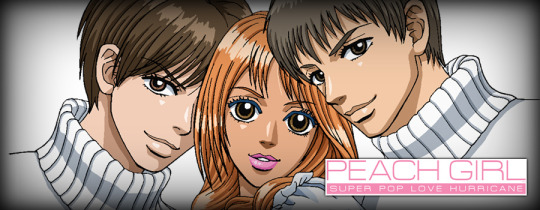
Spoilers for peach girl and tw for bullying, a mention of colourism, and blackmail
Genre: Romance, drama, slice of life, high school
Where I watched it: Funimation
Characterisation: 9/10 (Peach girl has a relatively small cast, but all the characters play an important role and are well developed in both personality and backstory. There’s a wide variety of personalities, and all of these add something important to the plot. Characters are designed to be deep and complex, and this keeps the story gripping as you’re always discovering new things about them, or watching them grow. As a character, I particularly liked Momo- she’s very kind and generous, always helping others and giving people the benefit of the doubt, and doesn’t give up easily- it’s clear that she’s strong, but she’s also portrayed as vulnerable and confused as she tries to navigate her complex emotions and figure out her life. Some of her struggles when it comes to love are ones quite a few viewers will understand, and that, along with Momo’s simple wish of wanting to be happy and truly cherished by someone, make her relatable as well as likeable. Two other characters I really liked the development of were Kairi and Sae. Kairi was initially presented as the archetypal carefree player at the beginning, flirting with all the girls and having little to no personality apart from that. However, it soon becomes clear that he’s more than that- he’s a loyal friend to Momo, staying by her side when everyone else, including her own boyfriend, have seemingly stabbed her in the back. It soon becomes clear that underneath this facade, he’s a selfless and caring person who will do anything to help those he loves. His backstory adds an unexpected layer of depth to his character- despite seeming so happy, he still feels certain events in his past deeply. On the other hand, Sae is portrayed as pure evil for most of the series- she bullies Momo mercilessly, spreading lies about her, turning all her friends against her, and even going as far as blackmailing her first boyfriend, Toji, into breaking up with her. However, at the end of the series, after experiencing love and heartbreak herself in a string of deeply distressing events, Sae opens up and starts to value Momo and those who have been nice to her, even helping them through their troubles, which would have been unthinkable at the beginning of the series. I love a redemption arc, and I’m all for people growing and changing for the better, which is why it was so great (and unexpected) to see Sae drop her old ways and become a good person.)
Setting: 8/10 (The settings are pretty typical of a high school, slice of life anime, with the school being a big one, the places where the students work in the summer, and all the hang out spots they visit in their spare time, like amusement parks. They are used effectively nonetheless, with certain places becoming meaningful in the story and mirroring past events, like the beach where Momo and Kairi first met.)
Art style: 7.5/10 (the art style is nothing out of the ordinary- it’s pretty standard for older anime, but the drawings are still pretty. Characters are well drawn and their appearances also change slightly throughout the anime, which adds a nice touch. I particularly like the way the settings are drawn - there are some beautiful sceneries. Colour pallets also generally hit the nail on the head, particularly when used in Momo’s incredible outfits.)
Plot: 8/10 (The plot is engaging and full of twists- it’s not always predictable, and you soon become invested in the emotional roller coaster, particularly when things take an unexpected turn. Tension is also used well in some episodes where big decisions have to be made. Despite some aspects of the plot being predictable, they still work very well and don’t take away from how enjoyable the anime is to watch. However, some events are dragged on for a bit, particularly towards the end.)
Comfort: 9.5/10 (This show was such a great one to kick back and relax to, especially after a long or trying day. The main reason for this is Momo as a character - most things about her, from her desire to be cherished and determined attitude, to her mistakes and the difficult patches, she made me feel somewhat seen. As well as that, her positivity and kindness really are contagious to the viewer, as well as her fighting spirit. On top of that, there are several wholesome scenes when the romance is going well, or heart warming displays of dedication when things are rough, which never failed to make me smile.)
Originality: 6.5/10 (Despite being almost flawlessly executed and combining a wealth of different occurrences so well, I don’t think Peach girl is anything too new (it might have been at the time, but definitely not now). It’s a pretty standard romantic drama, and, even though there are a few plot twists and ideas here and there which are creative or innovative, the main idea of having two guys falling in love with the same girl and a whole bunch of drama surrounding this definitely not.)
Addictiveness: 8.5/10 (This show is pretty addictive, because the characters are so well developed and the plot is dynamic and full of twists. Each episode also ends on a cliffhanger, so it’s easy to get hooked, as the engaging plot leaves you needing to know what will happen next.)
Philosophy: 7.5/10 (Despite generally being quite a light watch with few ideas that need unpicking, there are some interesting things said about love which I think are worth dedicating a few lines to. The first one is the idea that sometimes, we don’t realise how precious someone is to us until we almost lose them, which I think applies to daily life as well as the more tragic context of the anime. The second is that it’s easy to fall in love with the idea of a person you’ve created instead of actually loving them, or think you’ve fallen in love simply because you love the idea of having someone instead of the actual person, and the third is that love can often be confusing, unpredictable and uncontrollable- it’s rarely straightforward, and things often take time and pain to work out for the best. Through nuances like this, the series does a great job of capturing the complexity and essence of falling in love.)
Consistency: 8.5/10 (The quality of the episodes stayed high throughout the show, with little to no filler content. The ending dragged a little bit, but it was also full of suspense and uncertainty.)
The plot
Momo is an average high school girl - she likes shopping, swimming, and has had a crush on her childhood friend, Toji, for years. However, due to having heard from a jealous “friend” that he doesn’t like tanned girls, she thinks that he won’t reciprocate her feelings and is reluctant to ask him out at first. When she eventually does, he says yes and dismisses the rumor as a lie. It’s also discovered that Kairi, the school playboy, has taken a liking to Momo, who dismisses him at first, finding him annoying. Meanwhile, Sae, a classmate of Momo’s, grows jealous of her popularity and charm, as well as her relationship with the two boys, and goes from being catty to her to doing whatever she can to sabotage her, spreading rumors and deliberately making Momo look bad in front of Toji before and after they start dating in the hopes of putting him off of her and having a chance with him. Toji is unsuspecting due to Sae’s very manipulative and scheming personality, so he believes what Sae says, as do all of Momo’s other classmates, which causes her to become an outcast and puts a strain on her relationship with Toji. While she goes through all this, Kairi stays firmly by her side, knowing the kind of person she really is and trying to help Momo disprove the rumors Sae spreads. Through all the drama, Momo realizes she might also have feelings for Kairi, but, at the end of a long emotional roller coaster, and after much heartache, she has to make a final decision and realise who she truly loves.
Masterlist
#momo adachi#peach girl#peach girl toji#kairi okayasu#peach girl kairi#sae kashiwagi#ryo okayasu#romance anime#high school#slice of life#drama#nurse misao#peach girl review#peach girl anime review#anime and manga#anime review#anime recommendation#anime discussion#anime reccs#anime fandom#jolyneswifeanimereviews
12 notes
·
View notes
Text
No game no life anime review
Spoilers for no game no life and tw for sexualisation of minors, death, trauma/separation issues, and mention of suggestive conversations surrounding step siblings with a large age gap
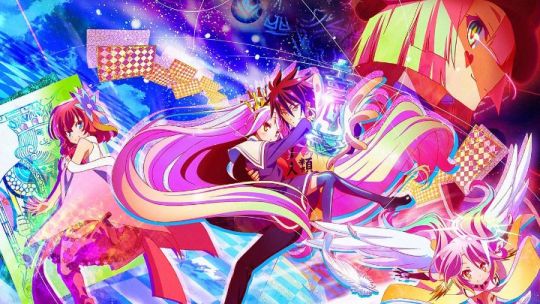
"In every time, in every world, the strong polish their fangs while the weak polish their wisdom," - Sora
Disclaimer: I've only seen the episodes of no game no life available on Netflix
Genre: Fantasy, action, fanservice
Where I watched it: Netflix
Characterisation: 7/10 (I actually really liked the way some of the characters were built - they had fun personalities which were distinct and unique to them, as well as defining characteristics and detailed dynamics in relationships with other characters. Even though they sometimes were not developed enough, I felt like they had potential, with a prime example of this being Kurami. This clearly doesn't apply for all characters- I feel like characters like Izuna weren't really given a personality and were more there for fanservice)
Setting: 8.5/10 ( I really love the maximalist and fantastical design of the game world Sora and Shiro get transported to. It is full of different lands with mystical features, and the human land seems like something from a few centuries ago, which also fits very well.)
Art style: 9/10 (One of the main reasons I started watching the anime was that I loved the way the characters were drawn - everything, from the futuristic and bold colour pallets, the detail in the eyes, and the delightfully personal outfits felt on point. Settings are also drawn with a similar care and attention to detail, which makes some scenes delightful to watch.)
Originality: 8/10 (The concept of getting transported into a game land is nothing new, but there are several characteristics no game no life has that sets it apart. For one, instead of being scared of, or trying to escape said game land, Sora and Shiro thoroughly enjoy life there, integrating and even going as far as wanting to expand human territories by conquering those of other races and challenge god. The way fights work in this anime is also distinct- everything is decided with games, and there are a set of rules each challenge has to meet. Each race has its own "race piece,", which resemble chess pieces (there are 16 races in total); if you defeat all other races and win all the pieces, you earn the right to challenge god, which is Sora and Shiro's big goal in the anime. At the start of the series, humans are struggling to stay on the map - they have very little territory to call their own, because all the other races keep defeating them with their unique powers, but, through Sora and Shiro's strategies, things start to improve for humans bit by bit, with the first big victory being the race piece and territory of the war beasts, which Sora and Shiro defeated in a video game despite their secrecy and sixth sense.)
Plot: 4/10 (The main idea is good- I liked the fact that the step siblings were transported into a game world, as well as the idea of the conflict with the other nations and the rules surrounding that, but, despite sounding great on the drawing board, these ideas were badly executed. The plot moved slowly, with several filler scene, and little progress was often made towards the main goal. Many of the earlier episodes were forgettable and just felt like short stories instead of fragments leading to something bigger. Other issues issues I have with the plot include the way Shiro is sometimes sexualised despite being literally 11 and some of the mildly suggestive undertones in certain interactions between Sora and Shiro, who are step siblings and are 7 years apart in age, with the former being 18. It’s hinted that they’re traumatised due to a difficult past and struggle with separation due to this, but this was not expanded on in the episodes I watched.)
Philosophy: 6/10 (This definitely isn’t a deep anime, or something that can be analysed and picked apart- it makes for a pretty light, casual watch. However, there are some interesting ideas about using tactics, intellect and determination to defeat large powers with unimaginable abilities when you are the underdog, and making this weakness your strength in doing so.)
Addictiveness: 4/10 (As previously stated, the plot was slow and lacked any elements to make it engaging and dynamic. This meant that I didn’t really get hooked, and there wasn’t that necessity to see what happened next.)
Consistency: 6.5/10 (The quality stayed fairly consistent throughout, decreasing when the episodes became less dynamic and more filled with fan service or filler scenes than scenes that developed the plot. However, the games were usually pretty engaging to watch.)
Comfort: 5.5/10 (While it’s a fairly light watch, there’s little comfort to this show- there is a nice friendship between the elf Fiel, and Zell, a human and her family’s former slave- they are clearly very attached to each other and greatly care about each other, as well as a few wholesome moments with the cast.)
The plot
Sora and Shiro are step siblings who dominate all the video games they play together under the username of blank. Their parents have died, leaving them alone to live as shut ins in a world they consider to be something akin to a bad video game. One day, they receive a message asking if they ever felt like they were born in the wrong world. They are then challenged to a chess match by this unknown person, which Shiro takes on. Despite her superior intelligence, she finds the match unexpectedly difficult and her victory is a hard won one. Sora and Shiro are then transported to a strange world where everything is different- they meet the god of that world, who explains he transported them there and tells them the rules of his world, where everything is decided by playing games, a process which must follow 3 concrete rules. Sora and Shiro quickly meet other humans, including Stephanie Dola, the princess of humanity, and learn that humanity is struggling to hold their own against all the other, more powerful, races in conflict, and have lost much territory and a lot of morale. However, her grandfather, who is now widely regarded as a fool, believed humans had the potential to win, and left that legacy behind. Gradually, and after winning the right to the throne in a game, Sora and Shiro begin to fight for humanity, using their intellect, tactics and impressive problem solving skills to compensate for their weaknesses and form successful strategies against impressive allies. After the first victory against Jibril, the flugel who had taken possession of the human library to satisfy her endless thirst for knowledge, humanity grew a bit more optimistic and the wheels were set in motion for more victories to win land from other races, which Soma and Shiro hope will eventually lead them to be able to challenge the god who introduced them to this world.
Masterlist
#sora no game no life#no game no life#no game no life shiro#stephanie dola#no game no life jibril#chlammy zell#no game no life fiel#fiel nirvalen#no game no life tet#no game no life izuna#ino hatsuse#izuna hatsuse#fantasy#video games#fan service#anime and manga#anime review#anime recommendation#anime reccs#anime discussion#no game no life review#no game no life anime review#jolyneswifeanimereviews
5 notes
·
View notes
Text
Sailor moon manga review
Spoilers for sailor moon and tw for kissing between a child and an adult
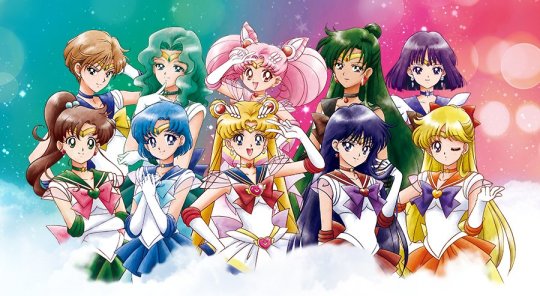
“If a soldier’s pride means hurting one another, I don’t want it,” - Usagi Tsukino
Genre: action, romance, magical girl
Characterisation: 9/10 (The sailor guardians, as well as the villains, are all incredibly different, with a wide range of personalities, strengths and aspirations. What I love about sailor moon is that all of these women are presented as powerful- they all have their function in the team and fight side by side, growing very close in the process. From kindness, intellect, bravery, stubbornness, and diligence to determination, vulnerability and humor, this show was one of the first to successfully present femininity in so many different, yet equally valuable, ways, which is something that we’ve thankfully grown accustomed to seeing. None of the girls are perfect- Usagi herself struggles to adapt to her role at first, making mistakes and wanting to surrender, but they all persevere through their battles and grow as fighters because of it. As well as having distinct personalities, some characters also have reasonably well developed backstories, which is something others lack on an individual level.)
Setting: 8/10 (With its galactic concept, sailor moon is often all over the place when it comes to setting- this adds depth to the story and expands on sailor guardians, as well as the main themes of the anime. Even though a lot of the story is set in Juban, a regular city in Japan, the girls also go to the moon to visit the moon kingdom they used to belong to, as well as the planets they protect on one occasion, where each one has their own castle. Not all of these settings are as well developed as the main one of Juban, but not all of them are as significant either. A piece of setting I particularly enjoyed was the game centre- the girls go there in the day to relax, hanging out together and leading the life of ordinary students, which adds a nice slice of life aspect. However, it also doubles as the sailor guardians’ headquarters- it’s a control room for missions and to collect intel, which nicely shows the duplicity in the girls’ own lives.)
Art style: 9/10 (I adore both the drawings in the manga, which are very detailed and picturesque, communicating the emotions and ambience of a scene visually, and the official artwork included- the colour pallet used in the official art is bright and pleasing. The way the drawi8ngs are arranged on the page is also skillful and attractive.)
Addictiveness: 6.5/10 (Although compelling in various points, the manga loses its appeal in others, especially during some of the later battles, which move slowly and start to drag. This makes certain points less interesting and tempting to skip, but other sections are very engaging and keep you so hooked that you could read them several times without getting bored.)
Consistency: 7/10 (There are some dips in quality here and there where the manga stops being engaging, and it also starts feeling slightly monotonous after a while. However, despite this, the quality stays very constant.)
Originality: 7/10 (A magical girl show of this type is nothing new, with the saving the world, diverse girlfriend groups, and glittery transformations. However, this manga kinda paved the way for several others later. The way the space concept is explored is also very unique to the anime, with intergalactic enemies and guardians all over the galaxy, as well as different dimensions. The usage of space, time and dimensions is definitely a new one, which greatly enriches plot and setting.)
Comfort: 8/10 (Sailor moon isn’t a heavy manga to read- even if the girls argue, there are troubles with love, or an enemy seems to have won, things always take a turn for the better and the day is always saved. On top of this, there are many wholesome romantic, friendship and domestic moments, and many more slice of life skits where the girls act like a regular group of friends. These tend to be quite lighthearted and funny, as well as relatable.)
Plot: 6.5/10 (The plot is usually dynamic, engaging and varied in action, romance and comedy. There are several sub plots, some of which are, in my opinion, unnecessary and downright gross. For example, the way Chibi Usa, who is mentally and physically a child, is kissed by Helios, who looks like a grown man, and this is romanticised, felt very creepy to me- I get that they were destined too end up together when she was an adult and not then, but this did not make that particular interaction okay in my eyes, because Chibi Usa was still a child. There are a few other uncomfortable sub plots that lean towards that kind of content.)
Philosophy: 7/10 ( While it does have eloquent phrasing and some worthwhile perspectives on love, determination and friendship from the battles and from Pluto, when she protects Chibi Usa and ultimately sacrifices herself, the manga itself is not too insightful and makes for quite a light read.)
Plot
Usagi Tsukino is just a normal student, fighting with her parents, struggling to get up to go to school and gossiping with her friends. After school, she likes to go to the game centre and play the Sailor V game- a game based off of the latest famous superhero, who has been catching criminals all over the city. Her life changes forever when she meets a strange black cat called Luna who tells her she is destined to be a guardian - her task is to find and protect the princess and the “legendary silver crystal,”. Usagi is incredulous at first, and just admires her transformation brooch. However, when she receives a vision seeing that Naru, her best friend, is being attacked by enemy monsters who are using her mother’s jewels as a means to drain the life energy of the customers, she spring to action, going down there to save her friend. At first, Usagi is unsure of how to fight, and almost gets discouraged, but, upon meeting a handsome stranger called Tuxedo Mask, who motivates her, she keeps fighting and ultimately defeats the monster, saving her friend and all the people in the store, and disrupting the dark Kingdom’s plans for the first (but definitely not the last) time. This marks the start of a new double life for Usagi- she’s a normal schoolgirl like she was before, but she’s also a powerful guardian of justice who saves and protects the city. She soon starts finding her allies, or the other guardians, with Luna’s help. The group become close and face increasingly dangerous situations, but they always come out on top, saving the day. Usagi’s relationship with Tuxedo also develops, and they grow inseparable on and off of the battlefield. As the manga goes on, more, unexpected allies are found from far away, as well as distant, but very powerful, foes, who come to earth with the sole purpose of fighting the sailor guardians.
Masterlist
#sailor moon#sailor moon manga#Sailor Mars#Sailor Mercury#Sailor Pluto#sailor jupiter#sailor scouts#sailor uranus#sailor neptune#sailor saturn#sailor venus#haruka tenoh#michiru kaioh#Setsuna Meioh#hotaru tomoe#neo queen serenity#chibi usa#makoto kino#Rei Hino#minako aino#usagi tsukino#ami mizuno#luna sailor moon#mamoru chiba#magical girl#romance#anime and manga#anime review#sailor moon review#sailor moon manga review
5 notes
·
View notes
Text
My favourite anime women- a miscellaneous list part 2
Spoilers for Attack on Titan, the promised Neverland,JJBA, food wars, Yu-Gi-Oh and fruits basket and tw for death, imprisonment, mentions of abuse, toxicity and manipulation, torture, trauma, sickness, gang lifestyle, and alcoholism.
Part 1
1. Zoë Hanji (Attack on titan)
(In the anime, Hanji uses feminine pronouns, but I know Isamaya wanted to leave their gender up to the reader’s interpretation in the manga, so I’ll be using gender neutral pronouns for them.)

“If there’s something you don’t understand, learn to understand it. It’s well worth any risk to our lives,” - Zoe Hanji
Hanji easily takes the crown as one of the best characters in attack on titan. Not only are they responsible for most of the comedy and funny skits in the anime, with their bizarre mannerisms and sense of humor, they are also a crucial member of the scouts. After Erwin died, Hanji was promoted from section commander to Commander of the entire scout regiment- they led all the scouts for the second half of the series, taking on a lot of responsibilities and difficult tasks, yet, given the circumstances, proving their skills. Hanji is also shown to be curious and intellectual, with most updates on titans, weapon improvements, or research coming from them. This makes it clear they value knowledge and are a good tactician, with the weapons they help to design contributing out a lot in battles. As a person, Hanji is also kind and fair minded, making calm and cool headed decisions. This, along with their constantly cheery personality (despite the terrible events of the anime) make Hanji an incredible asset for the series.
2. Ermes Costello (JJBA)

“Once I accept this new reality, it may come in handy... there’s no point in overthinking it,” - Ermes Costello
Ermes starts off in the series as an ordinary criminal, going to green dolphin street prison for robbery. From the start, we are given the impression that Ermes is tough and street smart- she has a calm attitude towards the whole thing, and gives Jolyne advice about surviving in prison, like how to sneak money in. Later on, Ermes acquires a stand of her own, and, despite having no one to guide her, quickly grasps how it works after emerging victorious in her perilous battle with McQueen. From then on, Ermes becomes Jolyne’s right hand lady and the two fight several battles together, with Ermes playing important roles in ensuring their survival, like in the battle against FF. Ermes’ stand, smack, can make copies of anything she wishes and unite these copies into one object again as soon as she decides. It’s a versatile power and her stand also works as a regular fighting stand. As well as being strong, Ermes cares for her friends and is kind hearted, often putting herself on the line to help Jolyne retrieve her dad’s disc.
3. Emma (the promised Neverland)
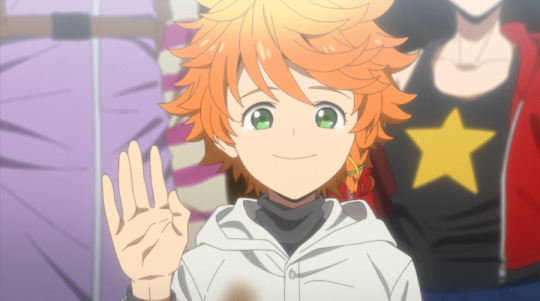
“If we mess up, we die. The outside world is, at worst, a world filled with demons. Even so, will you run away with us?” - Emma
Emma has quite a standard character development, but it’s effective nevertheless. The things she cares most about are peace and her family, and throughout the series, she stops at nothing and often risks her life to find ways to protect both, from evacuating the children from the farm before they are eaten to going against Norman and teaming up with Mujika to find a new agreement between demons and humans, one where no one has to suffer. Emma is stubborn and determined, two qualities she shows consistently throughout the series and help her accomplish even the most difficult of goals. As well as being athletic and having a lot of energy, Emma is incredibly smart and learns very quickly, ranking in the top 3 at the farm. Her intellect is very valuable when it comes to pursuing all her plans and putting them in action, like when she managed to train everyone to escape without Isabella noticing, despite the fact that she kept watch over them all day. Her cheerful, optimistic temperament and her “No one is left behind,” mentality, as well as her determination, bravery and intellect, set her up to be a great leader in season 2, when the children venture to the outside world. Everyone follows her and respects her.
4. Jolyne Cujoh (JJBA)

“I’m the one who gives orders. Now let me cross over,” - Jolyne Kujo
Jolyne is the protagonist of part 6 of JJBA, as well as the first female JoJo. She was put in prison after being framed for a crime by her boyfriend, who paid the lawyer to make her look guilty when he, in fact, was the perpetrator. Jolyne refuses to spend 15 years in prison for a crime she didn’t commit and was reluctant to hide; her anger at the lawyer for having stabbed her in the back comes out in the form of her stand, which she’d noticed prior to the trial, and had used to save Ermes from abusive policemen. Despite the terrible situation she is in, Jolyne keeps going and adapts to prison life, determined that to make things bend to her will- her powerful stand, as well as her intelligence and strategic thinking, allow her to outwit and beat several enemies. When Jolyne’s father, Jotaro, has his soul and stand stolen by Pale Snake, her entire focus shifts to saving him, which is something she perseveres with (despite the constant life threatening situations she finds herself in. Jolyne’s overall demeanor is calm and level headed- she’s benevolent and stands up for what she believes is right, but isn’t afraid to let things get messy if someone threatens her, ultimately meaning she comes out on top.
5. Ikumi Mito (Food wars)
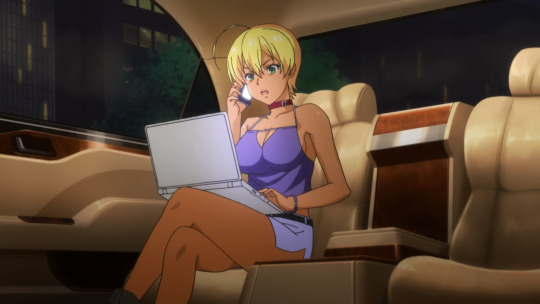
“I’m not gonna lose to you this time,” - Ikumi Mito
This might seem like an odd one to put here, but Ikumi Mito is, to me, one of the boldest women in food wars. Throughout the entire anime, even in the face f judgement, Mito is always and unapologetically herself. She shows confidence doing that too, being bold and assertive with rivals and speaking her mind honestly when she cares about a topic or is asked for her opinion. Despite being only a first year, Mito already holds a seat on the council of 10, which is made up of the 10 best students at Totsuki and their authority is only below that of the director. Her grades, as well as her careful and creative usage of meat, her specialty, in her dishes, explain why this is the case. However, as the anime proceeds, Mito learns to be more well balanced with her ingredients and becomes a more skilled chef for it. Despite her slightly tough exterior, Mito cares for her friends, particularly Soma, as she always cheers him on and helps him whenever she can, like during the summer holidays, when they designed a new meat dish for Soma’s eatery to beat competitor fast food restaurants.
6. Megumi Tadokoro (Food wars)

“In the prelims, I have to fight on my own,” - Megumi Tadakoro
Megumi is one of the few people in food wars who worked themselves up from nothing. She came from a humble family with a restaurant in a small village by the sea, and spent six months retaking the Totsuki entrance test until she finally passed. Despite the fact that the anime uses this information in a light, comedic way, I think it truly shows that at heart, Megumi is determined and passionate about what she does and refuses to get discouraged, even in the face of that many losses. She improves a lot throughout the anime as she gains confidence in her cooking, which has a tendency to make people feel comforted when they eat it. This belief in her abilities causes her to go from almost flunking out to one of the top students in the fall selection, which is the Totsuki competition to celebrate fine dining. Megumi makes it to the semi finals, and earns the respect of her fellow students by doing so. At the heart of Megumi’s character is kindness and care for others, and this is reflected in her cooking. However, Megumi is also stubborn, determined and diligent - she doesn’t back away from challenges, and worked hard to improve herself even when she was failing. This attitude was also seen when she was little and her grandfather got too old to break down the monkfish for the family restaurant. To help her family, Megumi persuaded some fishermen to teach her, and she didn’t surrender until it was perfect, regardless of how difficult it was.
7. Mai Valentine (Yu-Gi-Oh)
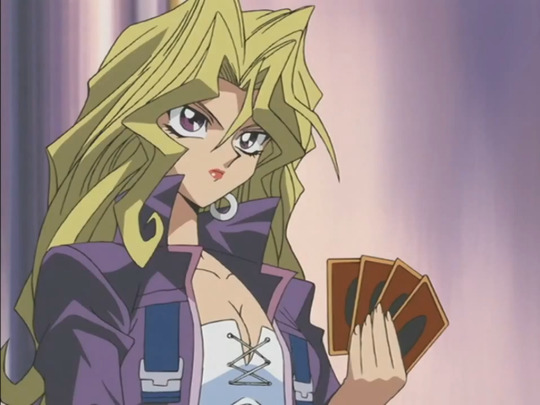
“Don’t sound so confident, you B-movie hack. Your monsters are just like your movies: second rate and not around for very long,” - Mai Valentine
In the first season and part of the second, Mai is a powerful rival to Yugi and his gang, making it close to the end of most dueling tournaments, and being one of only 8 duelists to enter Pegasus’ castle towards the end of the Duelist Kingdom tournament. Her deck is made up of strong women like Harpie Lady, and she uses them effectively to win battles. Mai starts off the series as a power hungry and vain woman who was only after the prize money. Personally, I don’t necessarily think this is a bad thing, because despite her antagonistic personality, she was an ambitious and strong woman who was determined to achieve her goals, the like of which can be quite rare in this kind of anime. Mai also uses her good looks to manipulate men to do her bidding, like when she made Rex Raptor duel Joey to get her revenge on him. While this is definitely not a good trait to have, I have a weakness for women with a bit of an ambitious villainous streak, as they tend to be bold and confident. However, after befriending Yugi and his friends, Mai becomes a lot more considerate of others and a lot less materialistic and self centred, growing as a person now that she isn’t alone in life anymore.
8. Rin Sohma (Fruits basket)
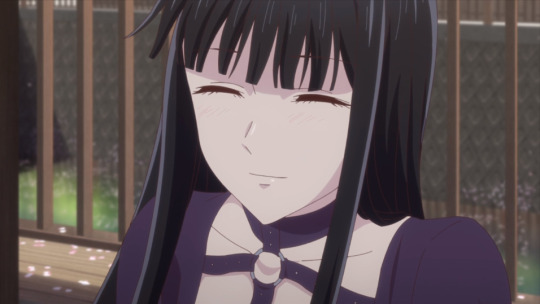
“A bond may seem like a beautiful thing from the outside... but if those involved see it as a burden, it’s nothing but a shackle,” - Rin Sohma
Rin is introduced to the series as very cold and uncaring, as well as troublesome. She is constantly running away from the hospital she is meant to be staying at, and degrades others, most notably her boyfriend, Haru, to put distance between them. However, despite her hard exterior, everything Rin was doing was meant to protect Haru - she desperately sought a way to end the zodiac curse, even when it meant she couldn’t take care of herself and ended up passing out. She embarked on this journey completely alone, as she was afraid she would end up exploiting people’s kindness and hurting them. This also put her in danger with Akito, the zodiac god, who severely punishes Rin by locking her away without food or drink when she finds her in her room, doing a favour for Akito’s vile mother Ren in exchange for information about the curse. Rin has many scars and a difficult background- Haru was one of the first people to show her true love and kindness, so it makes sense that everything she does is so focused on protecting him. Because of this, Rin is a serious person with a generally pessimistic view on life, but she is incredibly stubborn, determined and hard working, sacrificing almost everything and working endlessly to protect the person she loves, even when that means suffering herself. She’s also intelligent, managing to graduate from high school despite her low attendance on account of her poor health. Obviously, Rin still feels her traumas deeply, but, as she slowly begins to let others in and breaks down due to the strain her efforts were taking on her health, both mental and physical, she slowly starts to open up and move towards recovery. At the end, Rin is seemingly more relaxed and happy after these changes, and the fact that she’s processing, as well as starting to overcome, such trauma means she’s growing as a person and is strong and determined.
9. Tohru Honda (Fruits basket)
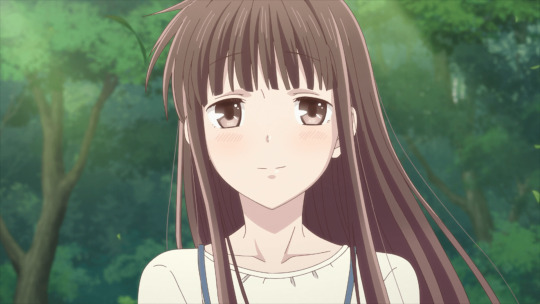
“I think no one is born already having a reason to be here. Because I think it might be something you need to decide for yourself,” - Tohru Honda
Tohru is the protagonist of Fruits Basket- one day, she happend to meet the Sohma boys, discover the curse and, from that moment, she became increasingly important for them. A central quality to Tohru is her kindness- she is always friendly, polite and willing to help, even if it inconveniences her, and she’s often giving even the most malicious people the benefit of the doubt. The most significant example of this is, when instead of being afraid of Akito or reacting to her misdeeds with violence of her own, Tohru reaches out a hand of friendship, saying they should “start again,”. In moments like these, Tohru’s endless empathy and kindness are presented as great strengths- instead of running away from dangerous or unpleasant situations, she gets knee deep in them to try to help everyone involved get better, with the most obvious example being her constant meddling to try to break the zodiac curse, despite her knowledge of Akito’s potentially dangerous behaviours. On top of that, she’s incredibly resilient and hardworking- even when she’s forced to live in alone in a tent due to the renovations in her grandfather’s house, she refuses to get crestfallen or give up, often working, both at school and the job she has to sustain herself, to the point of over exhaustion. Despite her lighthearted appearance, Tohru is very wise, and often says exactly the right thing to those in distress, which is a quality that helps her to gain the trust of and help all those around her.
10. Arisa Uotani (Fruits basket)
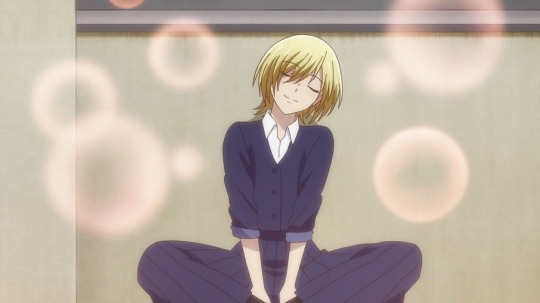
“Hey! Don’t pick a fight over something stupid just ‘cause your ego got bruised!” - Arisa Uotani
Arisa is probably one of my favourite fruits basket characters, which is really saying something, considering that one of the show’s biggest strengths is the character design and development. Feeling abandoned after her parents went through a difficult divorce and her father started drinking, Arisa joined a street gang and lived as an outlaw. In that period of her life, the only person she truly admired was the Crimson Butterfly, or Kyoko Honda, an famous biker who had risen in the ranks of the gang despite being female. Then, on one of the few days she showed up to school, she discovered that Tohru, a quiet girl who was basically her polar opposite, was Kyoko’s daughter. At first, Arisa was outraged that her idol now lived a quiet life as a “doting parent,”, but, after a while, she came out of her shell and grew very close to Tohru and her mother, finally deciding to quit the gang so that she could protect Tohru’s reputation at school, despite knowing the harsh punishment for those who quit- her bravery and the devotion she showed to her friend were really touching to me. A couple of years later, when the main story takes place, Arisa is still tough, headstrong and hot tempered- her street smarts are definitely still there, as is her endless devotion to Tohru. However, she’s now a lot more calm and mature, having grown a lot as a person, and being a lot more open and relaxed with others. Despite it having been difficult at first, Arisa persevered and made a life for herself inside the law, going to school and working 2 jobs to provide for herself.
Masterlist
#attack on titan#aot#snk#zoe hange#zoe hanj#jjba#jojo part 6#stone ocea#jjba ermes#ermes costello#the promised neverland#tpn emma#yugioh#mai valentine#fruits basket#rin sohma#isuzu sohma#tohru honda#arisa uotani#anime women#women in anime#jjba jolyne#jolyne cujoh#jolyne kujo#strong anime women#ikumi mito#Megumi Tadokoro#food wars#jolyneswifeanimereviews
1 note
·
View note
Text
My hero academia anime review
Spoilers for my hero academia and tw for family issues

Disclaimer: I have only watched everything up to about half of season 4.
“Even if it means twisting myself, I’ll win the way I choose,” - Katsuki Bakugo
Genre: action, high school, superhero
Where I watched it: Funimation
Characterisation: 8.5/10 (Characters have a very broad range of personalities and even minor side characters get some screen time. Most characters are gradually developed throughout the series, with the main characters being complex and diverse, but also improving as they learn more and make mistakes. An example is Todoroki’s struggle to view his fire as his own power after the abuse his father out his family through- gradually, he starts to realize that, despite it being the same power, it’s his power and he is not his father. There are a LOT of characters too, so there’s something for everyone. The series also strays from clichés a bit, making the characters more memorable, unique and the plot more enjoyable. An example of this is Uraraka, who appears light hearted, cutesy and carefree, but her real reason for becoming a hero is to make a lot of money so her parents can rest after working so hard for her whole life.)
Setting: 8/10 (As a setting, UA high school works very well- it has all the facilities that would be necessary for training future pro heroes for all kinds of situations, and the high school element adds a more realistic, slice of life feel. The setting is sometimes changed, with things like work studies at hero agencies or training camps, and this helps us to keep understanding this world and enjoy seeing the characters grow and develop. It also makes for a stimulating plot. Later on in the anime, the decision is also made to build dorms to keep the students safe from increasing villain attacks. This adds a nice, homely feel to the school, with each student personalising their room to reflect them, as well as creating opportunities for more relaxed and wholesome skits.)
Art style: 7/10 (The art style is pleasant- most characters are well drawn and their costumes as heroes are too. However, it’s nothing out of the ordinary, and settings tend to look way too computerised for my taste)
Plot: 8/10 (the plot is pretty fast paced and dynamic- it certainly doesn’t lack variety, as well as mysteries and questions that need answering. All this makes it quite engaging to watch, but sometimes, particularly with some battle arcs, some events dragged on for way too long, so I started to lose interest.)
Originality:9.5/10 (I absolutely adore the way this anime combined elements of a regular, slice of life, high school anime (friendships, rivalries, school events etc.) with a very comic like vision of heroes and superpowers. It managed to make the two go hand in hand in a very innovative way.)
Addictiveness: 7/10 (While the solid plot and the mystery elements, as well as the amazing world building do engage the viewer, I definitely wouldn’t say this anime was gripping- it didn’t leave me needing to know more, and, due to the storyline dragging in some arcs, I actually ended up losing interest for a short while)
Comfort: 7/10 (There are some darker areas to the anime- atrocious deeds are committed against vulnerable people, and there’s a lot of raw emotion too, due to the mental demand of being a hero. However, the friendship element of MHA, as well as the numerous funny or wholesome skits and the (for the most part) positive and good natured cast who always persevere make the anime quite comforting to watch.)
Philosophy: 8/10 (Due to the high level of character development, there are definitely some noteworthy points to take away from the anime. The majority of these are about self improvement, and come from the characters themselves growing. One of these is that you should never be so cocky that you don’t see your own weaknesses and don’t make progress, which is something Bakugo realised after failing his provisional license exam, despite being among the top students in the class. The main one however, is that no matter how impossible things seem, if someone is passionate, dedicated and works hard, they can make it happen. This is shown throughout Izuku’s own journey of training to become a hero.)
Consistency:7.5/10 (Despite the quality not really dropping from season to season, there are some areas where the plot drags and gets a bit repetitive, or where it becomes easy to lose interest.)
The plot
Izuku Midoriya dreams of becoming a pro hero, and has felt that way ever since he was a little kid. This was despite the fact that, in a superhuman society where 80% of people are born with some sort of power, or “quirk,”, he was born completely ordinary. When he saw All might, the number one hero, on TV as a kid, he grew to idolise him and wanted to become just like that. So, despite having no power, Izuku makes the decision to apply for UA, the school producing all the top pro heroes in Japan. His ambition is shut down by his childhood bully, Katsuki Bakugo, who insults him and tells him not to waste time applying- he himself is an amazing student with a powerful quirk. Before the UA entrance exam, Izuku meets all might, and asks him if he can ever become a hero. All might tells him he doesn’t think it’s possible, but a few days later, Izuku sees Bakugo being attacked by a villain and rushes to save him on impulse. After seeing all this, all might changes his mind, as it’s clear to him that Izuku has all the natural qualities of a pro hero. Because of this, he tells Izuku the secret about his own power, which greatly boosts strength and speed. It can be handed down from person to person- the previous user simply needs to choose someone, and all might has chosen Izuku. Once he knows this, Izuku works harder than ever, and he keeps up with a rigorous training regime all might sets up for him in order to be physically strong enough to wield the power. All might transfers his power to Izuku just before the entrance exams, telling him he will not be able to use it all straight away. The exam consists of taking down villain robots, with one robot being worth no points at all. Keeping in mind what all might told him, Izuku is cautious and reluctant to use his new power, but this quickly changes when he sees the 0 points robot heading towards a girl trapped under some rubble. The girl saved him from tripping up using her own zero gravity power before the exam, and had introduced herself as Ochaco Uraraka. Without thinking, Izuku jumps and punches the robot with all his strength, completely demolishing his arm in the process. He is then rushesd to the infirmary. This is the first of many challenges Izuku will face to become a pro hero, but his determination, as well as his skills, will only grow along the way, as he will work harder, and meet more incredible people; some mentors, some friends and some rivals.
Masterlist
#anime and manga#anime fandom#anime reccs#anime review#anime recommendation#my hero academia#katsuki bakugo mha#izuku midoriya#ochaco uraraka#tenya lida#ejiro kirishima#denki kaminari#momo yaoyorozu#kyoka jiro#bnha dabi#toga himiko#pro hero hawks#shoto torodoki#ua high#league of villains#all might#tamaki amakiji#bnha nejire#mha#bnha#mina ashido#mha review#mha anime review#bnha review#bnha anime review
1 note
·
View note
Text
My favourite anime women- a miscellaneous list
Hey :) so, this is the first part of a small series I’m working on about anime women I personally really admire ! Each post will contain about 10 women as well as my reasons for loving them (I’ll still be posting reviews).
Spoilers for seven deadly sins, sailor moon, high school dxd, madoka magica, MHA, and Violet Evergarden and tw for murder, forced marriage, suicide, and severe injuries
Part 2
Ami Mizuno (Sailor moon)
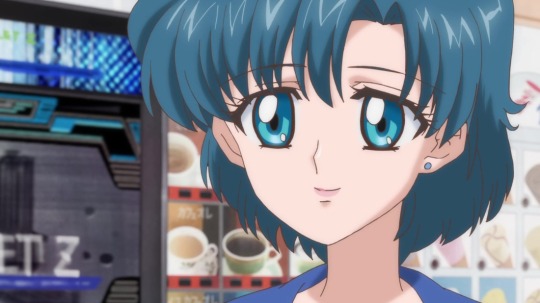
“The future is something that you build by yourself,” - Ami Mizuno
Out of the sailor guardians, I'd say Ami was without a doubt my favourite. Not only does she have water powers and plays a valuable support role in battle, but she's instrumental when it comes to the brains behind the team and their tactics. Logical, calculating, and intelligent, she always knows the right answer, and this is also because of all the intel she gathers to keep informed. As well as being a crucial part of the team, she studies really hard, and her diligence and intellect make her the top student at her school. With ambitions of becoming a doctor, Ami has a passion for problem solving and academics, so she can often be seen reading. I adored how knowledgeable and dedicated she is, and I respected her hard work, as well as her high position as a student. Both, as well as the fact that she's the brains behind the sailor guardians, made her really inspirational to me.
2. Rei Hino (Sailor moon)

(Please bear in mind I am talking about the manga version of Rei, who is quite different from the anime Rei)
“I don’t care if it’s a ghost or not, if a guy falls for seduction it’s his own damned fault,”
Rei is powerful and strong, with her spiritual powers leading to a formidable intuition and almost being able to sense the future. As well as that, Rei is stubborn, hot-tempered and she has a bit of a sharp tongue. This means she doesn't take crap from anyone and will always point out issues with brutal honesty, as well as pursuing things in the way she deems correct. This can be seen in her refusal to marry due to lack of interest- Rei wants to become a high priestess for her grandfather's shrine, and is very dedicated to this. She later shows the same passion and dedication to protecting sailor moon. I loved her conviction, strength and independence, as well as her down to earth and blunt attitude.
3. Makoto Kino (Sailor moon)

“It’s kind of sad that you think love is something you should take,”
As well as being incredibly physically strong and athletic, Makoto is a very protective friend who is always looking out for others and helping them. Despite not having had an easy life, with both her parents dying, she continues to persevere and face the challenges of being a sailor guardian. Makoto also combines all her protective strength, diligence and determination with a softer and more stereotypically feminine side- she loves gardening and baking, and is very proficient at both. This is also seen in her romantic and sentimental personality. However, in the case of Makoto, her femininity is presented as a strength, not something weak or inferior, especially when combined with all her other strengths.
4. Setsuna Meio (Sailor moon)
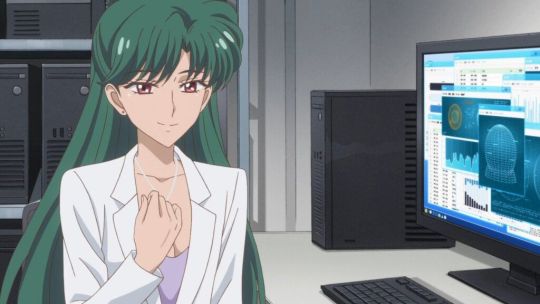
“Watching over someone from afar is a kind of love, too,”
Setsuna is knowledgeable and logical- she studies from afar and tries to figure out the enemy and their intention. On earth, she had a career as a nurse and later as a researcher at a university, which both illustrate her academic and intellectual prowess. As well as that, despite appearing slightly aloof and cold, Setsuna cares a great deal for all her teammates and she helped raise Hotaru when she was reborn as a baby. As well as keeping watch over everyone, Setsuna was also one of the few friends Chibi Usa had growing up- she was often lonely, and, due to her kind, caring nature. Setsuna would comfort her.
5. Merlin (Seven deadly sins)

“A human ceases to be once they stop thinking,”
Merlin is the most powerful mage in Britannia and one of the seven deadly sins- her magical strength is unrivalled, with the power of her treasure (which she can be seen using in spells) being versatile and almost infinite. Despite being playful, kind hearted and cheerful most of the time, Merlin is mysterious and serious, with a level headed and calm nature- she never loses her composure. Above all else, Merlin values knowledge- she is always running experiments or reading in an attempt to discover as much as she can about the world. Merlin is often depicted as confident and independent throughout the series, standing up for herself and being more than capable of fighting in battles. Her power and intellect, as well as her cool, confident, level headed, and yet kind personality make her an icon in my eyes.
6. Rias Gremory (high school dxd)
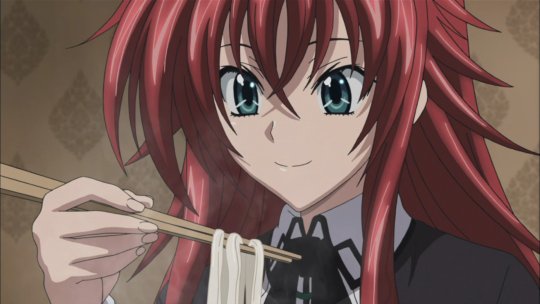
“We haven’t lost yet ! You lose when you’ve given up,” - Rias Gremory
Those who have already read my post on Rias will be familiar with my take on her, but I think she was worth including here for quite a few, often forgotten, reasons. The show often oversexualises her and sometimes portrays her as being nothing but Issei’s love interest, but that is only one side of the coin. Obviously, her powers are strong and she’s phenomenal on the battlefield, which is how she’s earned the nickname “princess of ruin,”. Rias is also a calm, level headed and diligent leader who greatly cares for her servants, stopping at nothing to ensure their safety and getting revenge if they are insulted. She also helps them to grow and develop as fighters, with the training camp before her rating game against Phoenix being an example. As well as that, Rias is also logical, calculating and intelligent- from her victories in chess, to her skill in the classroom, to her strategizing before battle, it’s clear she has a good brain. On top of all that, Rias is independent, determined and hard-working- when she was offered the chance to participate in a rating game against Phoenix to win her right to not be forced to marry him, Rias accepted without hesitation, despite having no experience and her opponent being one of the best. She worked her team really hard and even stopped sleeping to prepare as much as she could, and fought with dignity and determination until the very end, all for her independence and the right to make her own decisions.
7. Kyoko Sakura (Madoka Magica)
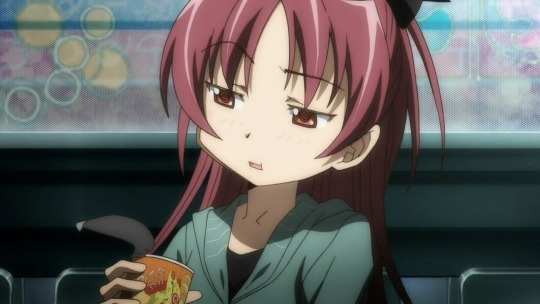
“You know what I think ? You take what you’ve got and figure out how to get something out of it,” - Kyoko Sakura
This is another one that might seems slightly unusual. Kyoko was introduced to the series as a greedy, selfish and unsympathetic girl, showing no remorse for the humans who got killed by witches and laughing at Sayaka for her “naïve,” belief in justice. However, when we later find out more about her, it becomes abundantly clearthat the true Kyoko is someone kind and selfless. She first became a magical girl to save her family from poverty and make her father happy, but, after her wish went horribly wrong, Kyoko’s father ended up spiralling into despair and killing himself as well as her whole family. This led Kyoko to believe that magic should only be used for one’s own gain, and using it for anything else only leads to pain. She explained all this to Sayaka after their fight, trying to save her from making the same mistakes she did so she wouldn’t have to suffer, which she wouldn’t have bothered with if she was truly selfish. In fact, Kyoko saw a mirror of her past self in Sayaka- someone selfless with a firm belief in justice. Sayaka dismissed Kyoko’s warning, which gradually led her down a path of despair, until she herself became a witch. Just before this happened, Kyoko sought her out to check up on her, trying to get her to listen one last time to protect her from the suffering. Even after Sayaka became a witch, Kyoko reached out to Madoka and told her about her plan to see if Sayaka could be converted to a human again. When this failed, Kyoko gave up on her own life so that Madoka and Homura can get away safely and so Sayaka’s witch form could be eliminated as a threat. The true Kyoko was someone strong and selfless, who in the end, sacrificed everything for the sake of trying to save someone else, and only acted based on good intentions.
8. Momo Yaoyorozu (MHA)
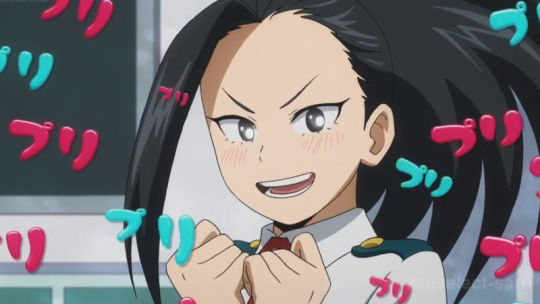
“We should always start with the basics to develop the depth of learning. We must strive to devote ourselves wholeheartedly,”- Momo Yaoyorozu
Momo is easily the smartest, most knowledgeable person in class 1-A. Not only does she always have a strategy and an answer ready, she also scored the highest on the mid terms and was one of three students who got in based on recommendations. The nature of her quirk means she needs to study a lot and be a good tactician- she can make anything from the lipids in her body, as long as she understands that object’s chemical composition. This power is useful and versatile, and Momo uses it with increasing efficacy and confidence as the anime progresses. She was determined to improve after her confidence took a nosedive due to her loss at the sports festival, and this led to her making considerable progress and being instrumental in later victories for team exercises. Momo is also happy to help her classmates with their studies- she was thrilled to host a study session all together before the exams, which shows that, despite a cool exterior, she’s sweet and selfless.
9. Kyoka Jiro (MHA)
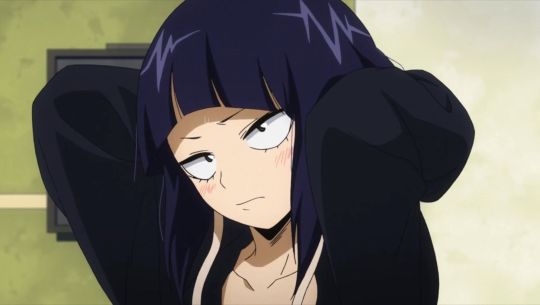
“If you do this, we just might win. But there’s no time to hesitate,” - Kyoka Jiro
As well as wanting to become a hero, Jiro is passionate about music and can play many instruments. This is even reflected in the way she dresses and decorated her dorm- her style has a dark, punk vibe to it, which I very much respected. Because of this passion of hers, she was crucial to class 1-A’s concert for the school culture festival- she pretty much led and managed everything due to her vast knowledge of music. This also helped her realise that she didn’t really have to choose between being a hero and music, two things she’s very dedicated to and works hard at- she could, in some sense, have both.
10. Violet Evergarden (Violet Evergarden)
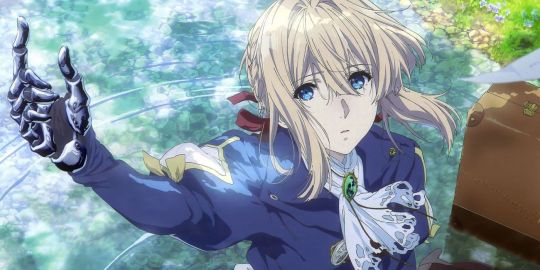
“The worst battle is between what you know and what you feel,” - Violet Evergarden
Violet was an orphaned child taken in by an army Major. Because of her skill on the battlefield and the way she could take out several soldiers with very little problem, she quickly made a name for herself. In the last battle of the war, things got very sour for Violet and the Major, who was on the verge of dying, as the enemies kept firing. No matter what was happening, Violet always protected him courageously. Her determination to protect him and her selflessness didn’t save him, and Violet lost both arms in the battle, so she had to be hospitalised and provided with metal prosthetics. After her hospitalisation, Violet starts to work as an auto memory doll for the Major’s friend’s company. She is scarred from the war and doesn’t understand emotions due to that, so in an effort to figure out the meaning of “I love you,”, she begins writing letters for others to express their feelings in eloquent ways. At first, despite excelling at English, Violet is unable to transform the feelings she doesn’t understand into words. However, as the show goes on, she gets progressively better at it and is faced with many different emotions, many of which stem from difficult situations. Violet quickly adapts and deals with these, becoming one of the best auto memory dolls in the company, and gaining an understanding of the emotions she previously lacked. Violet’s talent, her intellect and her determination, as well as her loyalty to her love and her prowess on the battlefield, all made me admire her when I watched the anime, but on top of all that was her increased understanding of the world and her hard work. When the war was threatening to start up again, Violet nobly risked her life to fight for peace.
Masterlist
#violet evergarden#rias gremory#momo yaoyozoru#kyoko sakura#kyoka jiro#setsuna meioh#ami mizuno#rei hino#makoto kino#merlin#seven deadly sins#mha#bnha#high school dxd#puella magi madoka magica#pmmm#sailor moon#sailor mercury#sailor mars#sailor pluto#sailor jupiter#women in anime#female representation#feminism#anime and manga#anime fandom#anime discussion#anime reccs#strong anime women#jolyneswifeanimereviews
3 notes
·
View notes
Text
Food wars anime review
Spoilers for food wars and mentions of nudity
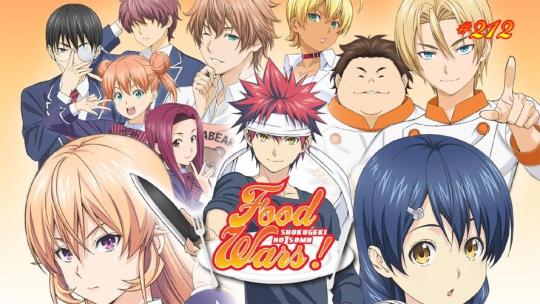
Disclaimer : I've only watched the first 2 seasons of food wars, because the rest aren't available on Netflix.
“Repeating trial and error and failing many times... it’s that process which makes dishes shine,” - Soma Yukihira
Genre: Slice of life, cooking, high school, comedy
Where I watched it: Netflix
Characterisation: 8/10 (The characters come form very different backgrounds and have distinct personalities, which all translate in their cooking. They are developed throughout the series, becoming more individual and gaining confidence in themselves, like Megumi, or understanding themselves better, like Hisako or Mito. Their backstories, where revealed, are intricate and original, fitting for them as individuals.)
Setting: 7.5/10 (I really liked the shift from Soma’s humble family diner to the grand cooking school- it really shows he’s entering a different world. The school caters to everything as it should, with cosy dorms where Soma and his friends hang out after class and grand stages for cooking competitions like the fall selection. One thing I particularly liked was the training camp- the fast paced plots and the changes in setting to match the activities made it really fun to watch. Apart from that, nothing stands out in particular.)
Art style: 9/10 (I absolutely love the way the characters are drawn ! Although it is nothing too unique, the style is really pleasing, and each character’s appearance is thoughtful and reflective of them. Settings are also drawn carefully and with attention to detail; this makes the anime all the more complete and enjoyable. Something that is definitely worth mentioning in this section is the food- I adore the way food is drawn in anime, and with this anime, you get to see many creative dishes presented in artistic ways.)
Plot: 8.5/10 (The plot is well executed and fast paced, with just the right level of build up before important cooking events. There’s a lot of anticipation too, as well as a few plot twists which keep the anime engaging. Despite the fact that the central focus of the series is cooking, there are many other elements and sub plots (romance, rivalries etc) which just add to the richness of the plot. However, it definitely falls short in one aspect- when the judges (or anyone, for that matter) eat good food, all their clothes come off (especially if they are women) and we find ourselves viewing strange scenarios in their heads which are somewhat linked to what they feel about the food. While I understand it’s meant to illustrate the impact the food has on the judges, I think there are better ways to go about it, because some of those scenes feel awkward and downright bizarre.)
Comfort: 8/10 (Food wars is a pretty light hearted and relaxing anime to watch- it’s humorous and feel good, with the characters growing close and becoming more skilled and confident with each other’s help. There are plenty of wholesome scenes with the cast, and Soma’s carefree, happy vibes are definitely contagious for viewers.)
Addictiveness: 9/10 (The bright, bold characters and the interesting dynamics between them, as well as the fast paced plot, the thrill of the cooking battles, and the dangerously competitive feel of some episodes make this anime very addictive, even for those who aren’t too interested in cooking.)
Philosophy: 6.5/10 (As a more light hearted anime, it doesn’t have many deep messages, but it does showcase the value of friendship in our lives, particularly with Megumi and Soma- their relationship, as well as finally having someone to believe in her and support her, leads Megumi to develop self-confidence and become a very skilled chef. The series also illustrates the benefits gained from having to fight through difficult situations, with the most skilled chefs coming from the most humble or demanding backgrounds, and how much losses can help you improve, if you learn from them and don’t get discouraged. This is the secret to Soma’s cooking.)
Consistency: 8/10 (The show’s quality is consistent throughout- it stays engaging and gripping as the series continues, with some arcs being slightly less exciting but still pleasant to watch.)
Originality: 9/10 (I have never seen a show combine slice of life elements, regular high school life and high stakes cooking battles in such a harmonious way. The school itself, as well as all the opportunities and contests offered, are unique to the anime, as is the way the food battles are executed.)
The plot
Soma Yukihira works in his father’s eatery, fighting every day to improve his cooking and please customers. He takes great pride in the restaurant, and hopes to one day take over from his dad. One day, his father leaves due to business and tells him he is to sign up to Totsuki academy, the most prestigious cooking school in Japan. Initially, Soma is skeptical, but he attends the entrance exam regardless. However, when the candidates see who is judging their dishes for the exam, they all flee in a panic apart from Soma, who is up to the challenge. The judge is Erina Nakiri, a celebrity in the food industry and the director’s granddaughter. She is known for having a very fine palette and being almost impossible to please. Not knowing any of this, Soma begins working on his dish, which needs to incorporate eggs. When Erina tries it, it’s clear she likes it, but she refuses to bow to Soma, as she views his more humble background in cooking as “common,”. Because of this, she tells him he has failed the exam. However, the school director was watching in secret, and contacts Soma to let him know he passed. At the entrance ceremony, Soma makes a speech as the transfer student, saying he fully intends to take the top spot at the academy, as it would be embarrassing for him to lose to a group of people who have never actually worked in a kitchen. His bold declaration of battle offends most of the students, but Soma is blissfully ignorant to that. This marks the start of Soma’s stay at Totsuki- he will meet many different chefs from all over the world, and complete a vast range of challenges, all the while making good friends and meeting strong rivals.
Masterlist
#anime and manga#anime fandom#anime reccs#anime review#anime recommendation#comedy#high school#cooking#slice of life#soma yukihira#erina nakiri#ryo kurokiba#alice nakiri#hayama akira#takumi aldini#isami aldini#cooking contest#ikumi mito#megumi tadokoro#ryoko sakaki#jun shiomi#hisako arato#satoshi isshiki#tosuke megishima#anime discussion#joichiro saiba#food wars#food wars anime review#food wars review#jolyneswifeanimereviews
4 notes
·
View notes
Text
What do y'all want me to cover? Leave any requests in the comments!
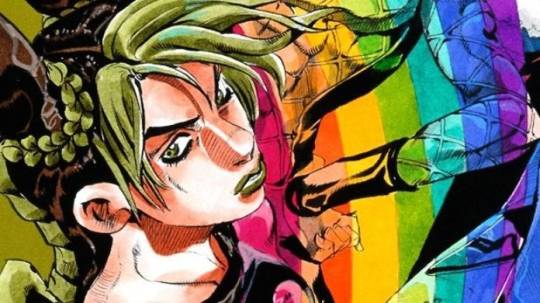
#anime and manga#anime fandom#anime review#anime reccs#anime recommendation#request anything#jolyneswifeanimereviews#my wrtitng
0 notes
Text
Why Candy is an icon
Major spoilers for Candy Candy and tw for verbal harassment not explicitly discussed in this post) and death
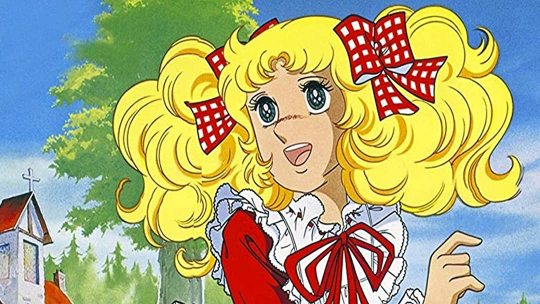
This anime was one of my favourites as a kid and to this day, it still holds a special place in my heart. While it definitely has quite a few noteworthy characters, none stood out to me like Candy herself, and this is a list of reasons why
She enjoyed more stereotypically "masculine," things and threw the "delicate girl," stereotypes down the toilet- in early 20th century America, when the anime is set, girls were not expected to have hobbies like climbing trees or playing at cowboys, but this is exactly what Candy did, regardless of all the skepticism she faced and the negative comments from those around her about how it was "dangerous,". She dominated too, being skilled enough at tree climbing to beat a professional and win a bet against him in the process. She also had a bit of a temper and a rough side, which also lines up with this - she was often shown getting into scrapes with the boys when they provoked her, and later on with the Leagan children. It's definitely clear that Candy wasn't afraid to stand up for herself and fight against what she deemed unfair, talking back to adults and breaking school rules she deemed unjust, like when she his her pet racoon in the forest so she could keep him.
She never threw in the towel - Candy's life was a very difficult one as shown by the anime. First, the best friend she has known for her entire life leaves her and the children's home they both grew up in, then she's adopted by a family who uses her as a servant and is forced to deal with constant verbal abuse at the hands of their children, who stop at nothing to try to sabotage her, even causing her to get sent to work in Mexico for a period of time, and when it seems like things are finally taking a turn for the better as her relationship with Anthony starts to take off, he dies in a horse riding accident, leaving Candy devastated. A few years later, Candy goes to study in London and meets her next love, Terry Grantchester. The two develop deep feelings for each other but, after they get in trouble with the school directors, Terry is forced to leave so she won't have to. After a while, Candy also leaves to pursue a path in life that is completely her own - she starts to train to become a nurse, after experiencing first hand what it feels like to help the sick. In all this, no matter how difficult life got, how alone she felt or how scared she was, Candy still kept going, even when she was hesitant, in order to reach her goals and find happiness. The fact that she managed to persevere through so much, all the while keeping her smile and staying cheerful throughout the anime, shows a huge amount of mental strength and determination, which are two of Candy's most admirable qualities.
Candy was selfless - her own ambition is proof of this- wanting to become a nurse to help people get better. This is even more clear when she starts working for Dr Martin, despite the fact he can't pay her. Another point in the series when this selflessness is evident is when she was willing to give up everything she had with Terry after realising Susanna, a young actress who was in a terrible accident, needed him by her side to carry on living. Candy realised his importance in her life and left, trying her best to move on.
Candy showed a lot of loyalty to her friends - From the start of the series, Candy is always shown helping and protecting those she considered friends. From helping Pattie hide her pet from the teachers, to pretending she doesn't know Annie so her past at the children's home can remain a secret, just as her parents wished, to nursing Albert back to health when he got amnesia and even staying with him until he regained his memory, Candy definitely did a lot for those close to her and was the type to stick by her friends, no matter how painful or uncomfortable things got.
Candy was stubborn and opinionated - she had her beliefs and principles, and didn't shift from them, even when she was pressured to or when they caused her pain. Throughout the show, she continued to stand up for them and make decisions based on them, even when others were unhappy with these decisions.
She was a style icon - the dresses she wore throughout the series (when she did wear dresses) were instrumental in influencing today's soft, cutesy and fairy tale Lolita style, which means the impact of her stunning princess dresses is still felt today.
If you want to know my thoughts on Candy candy as a whole, click here
Masterlist
#candy candy#terry grandchester#anthony brown#anime and manga#anime fandom#anime discussion#character analysis#old anime#lolita fashion#women in anime#women representation#tw death#eliza legan#neal legan#archie cromwell#stear#miss pony#annie brighton#patricia o'brien#albert andrew#jolyneswifeanimereviews
66 notes
·
View notes
Text
Your lie in April anime review
Spoilers for your lie in April and tw for death, trauma and family issues

“Even in the depths of the darkest oceans, some light always pierces through,” - Kousei Arima
Genre: tragedy, music (piano/violin), slice of life, romance, high school
Where I watched it: Netfilx
Characterisation: 9.5/10 ( The characters are all given very distinct, yet believable, personalities, as well as flaws - all of them hesitate and make mistakes, and all of them learn something about what they actually want in the process. Even Kaori, who is always impossibly cheery and energetic, and Watari, who has a light hearted and humorous demeanor, are shown slipping up and getting discouraged. All characters have detailed backstories and well explained motives, which only get better as the series develops them)
Setting: 8/10 (The high school where all the characters go is a pretty standard anime setting. The more noteworthy things include Kousei's house, with the dusty piano room, ever present even when he tries to forget, the hospital where a lot of Kousei's grief is set, and the various very grand theatres where the piano competitions are held and where Kousei makes, breaks and rebuilds his reputation, as well as developing a relationship with Kaori)
Plot: 8.5/10 (One of my favourite anime ever. The plot is full of twists and has quite a few mysteries and side plots, which all link together beautifully in Kaori’s letter in the end, offering Kousei, and the viewer, closure. While some episodes are heartbreaking as the viewer finds out more about the abuse Kousei was forced to endure from his mother, others are quite comforting and romantic, as Kaori makes him realize he can play because he enjoys it and as himself, and that he’s much more than his mother’s tool.)
Comfort: 5/10 (This anime really is a roller coaster to watch- Kousei goes through depressing life situations, which are executed in a way that makes the viewer feel the pain or fear too. However, there are also several feel good scenes at the start of Kousei and Kaori’s friendship, with her helping him find himself and move past his mother’s death and abuse. Their playing together is also pleasant to watch, but soon, their relationship starts to be tinged with loss and sadness as well. There are quite a few humorous scenes with Kousei’s friends, particularly the playboy and captain of the football team, Ryota Watari.)
Art style: 9.5/10 (I absolutely adore the way the characters are drawn! They all look realistic and developed, with the eyes truly reflecting their personalities. The setting is drawn in a very aesthetic way too, with cherry blossom trees, grand halls for competitions, and starry skies on shimmering waters. This alone made it truly a pleasure to watch! The colour pallet goes from vibrant when Kaori enters Kosei’s life and helps him to move on from everything that happened, to muted and dull when things begin to deteriorate for him, reflecting the mood. Sometimes, in flashbacks about Kosei’s mother, she is shown in black and white, or with no eyes, which makes her appear all the more wicked and terrifying. References to colour are also often made to symbolise emotions and outlook on life)
Addictiveness: 10/10 (The series is very addictive, with constant twists and urgent mysteries in the plot, as well as mysteries and developments with all the characters. This made it impossible to stop watching- there are major cliffhangers. Luckily, at 24 episodes, it is not too demanding to watch.)
Philosophy: 8/10 (This anime is quite psychological, with Kousei’s mother abusing him for most of his childhood and dying when he’s 14. This leaves him unable to play the piano- he sees the ghost of his mother whenever he does and can’t hear the notes as a result- and forces him to abandon his career as a piano prodigy. Because of this, much of the anime is about recovery- Kousei discovers himself and his own love for playing, separate from the metronome-like style his mother had forced him to adopt. He also gains more insight into his feelings as he does so, realising that, in a twisted way, his mother ways trying to help him have a livelihood and support himself after she passed. With this realization, he’s finally able to move past the ghost of his mother and look at life from another perspective. All the characters fight their own mental battles, some putting up cheerful fronts and falling apart later on in the series, and others making mistakes and questionable decisions to find their happiness.)
Originality: 9/10 (I have never seen an anime combine so many elements so beautifully: there’s the music aspect, with the rivalries between the top players and competitions, the romance aspect, with Kousei’s feelings for Kaori, who is dating his best friend and the two growing closer, as well as Tsubaki’s chaotic romantic discoveries, and there’s a more tragic aspect, with the relationship between Kousei and his mother, her death, and what later happens to Kaori)
Consistency: 8.5/10 (The series keeps up a consistently high quality throughout. There are some seemingly less relevant aspects, like Kousei becoming Nagi’s piano teacher and helping her perform for a school concert, but I think these help us build a picture of Kousei recovering and making his piano playing, as well as his life, his own)
The plot
Kousei Arima used to be a piano prodigy- he was one of the most promising young pianists in Japan, winning every competition he entered and shocking the judges with his seemingly impossibly accurate replications of the score. However, after his abusive mother died, he found himself unable to hear the notes, and remembering her and the physical and mental abuse he went through whenever he played. As a result, he resigned from his career as a pianist. Two years later, his best friend, Tsubaki Sawabe, forces him to come along to a date she arranged between her friend, Kaori Miyazono, and Kousei’s other best friend, Ryota Watari. He gets there earlier than the other two, and is instantly stunned when he sees Kaori. The group later goes to see her perform at a concert, which is also deeply shocking to Kousei- she plays with skill and passion, but instead of sticking to the score, she changes the pieces she plays to her liking. Afterwards, Kaori manages to persuade Kousei to accompany her on the piano at her next competition. Initially, Kousei bails, saying he can’t hear the notes, but after seeing how much Kaori needs him and how nervous she is, he changes his mind and the group rush to the concert hall together. The performance starts off good, but then Kousei stops hearing the notes, resulting in a catastrophic second part. This is just the beginning of his new piano career- with Kaori by his side, he soon falls back into performing, entering competitions by himself and meeting old industry rivals who have all but forgotten him. As Kousei continues playing and starts moving past the scars his mother left him, realising her ghost is just a figment of his trauma and her actions were a form of twisted and misguided love, his relationship with Kaori becomes stronger and the two grow very close. However, Kousei soon learns something life changing about Kaori, which causes him to deteriorate all over again, and this time there is no one but his mother’s old collegue, Ms Seto, to force him out of the dumps and make him carry on playing.
Masterlist
#your lie in april#piano#music#classical music#arima kousei#ryota watari#kaori miyazono#tsubaki sawabe#nao kashiwagi#emi igawa#takeshi aiza#nagi aiza#saki arima#hiroko seto#slice of life#high school#tragedy#romance#anime review#anime and manga#anime reccs#anime fandom#anime discussion#anime recommendation#tw family issues#tw trauma#tw death#your lie in april anime review#your lie in april review#jolyneswifeanimereviews
20 notes
·
View notes